‘Ragtag’ investments cannot replace HS2
Prime minister Rishi Sunak announces that high speed line won’t go north of Birmingham - but ‘every single penny’ saved will be invested in transport
After a long and intense period of speculation, prime minister Rishi Sunak finally announced that his government is scrapping HS2 north of Birmingham this week.
Addressing the Conservative Party conference in Manchester, Sunak revealed that the high speed line would no longer be extended to Manchester. He claimed he had taken this decision in response to the scheme’s spiralling costs and changed postCovid travel patterns. Instead he said that “every single penny” of the £36bn saved would be invested in a range of transport schemes, across the entire country.
In the north of England, these
investments are improved EastWest rail links across the north of England, a £700m bus funding package, the Leeds tram and the reopening of the Don Valley Line.
“Our plan will drive far more growth and opportunity in the north than a faster train to London ever would,” said Sunak.
In the Midlands, the government is proposing to fund the Midlands Rail Hub and the
extension of the Midlands Metro.
Elsewhere, there is a new £2.5bn fund to transform local transport for smaller cities and towns, the extension of England’s £2 bus fare cap until December 2024, and a range of projects for new roads.
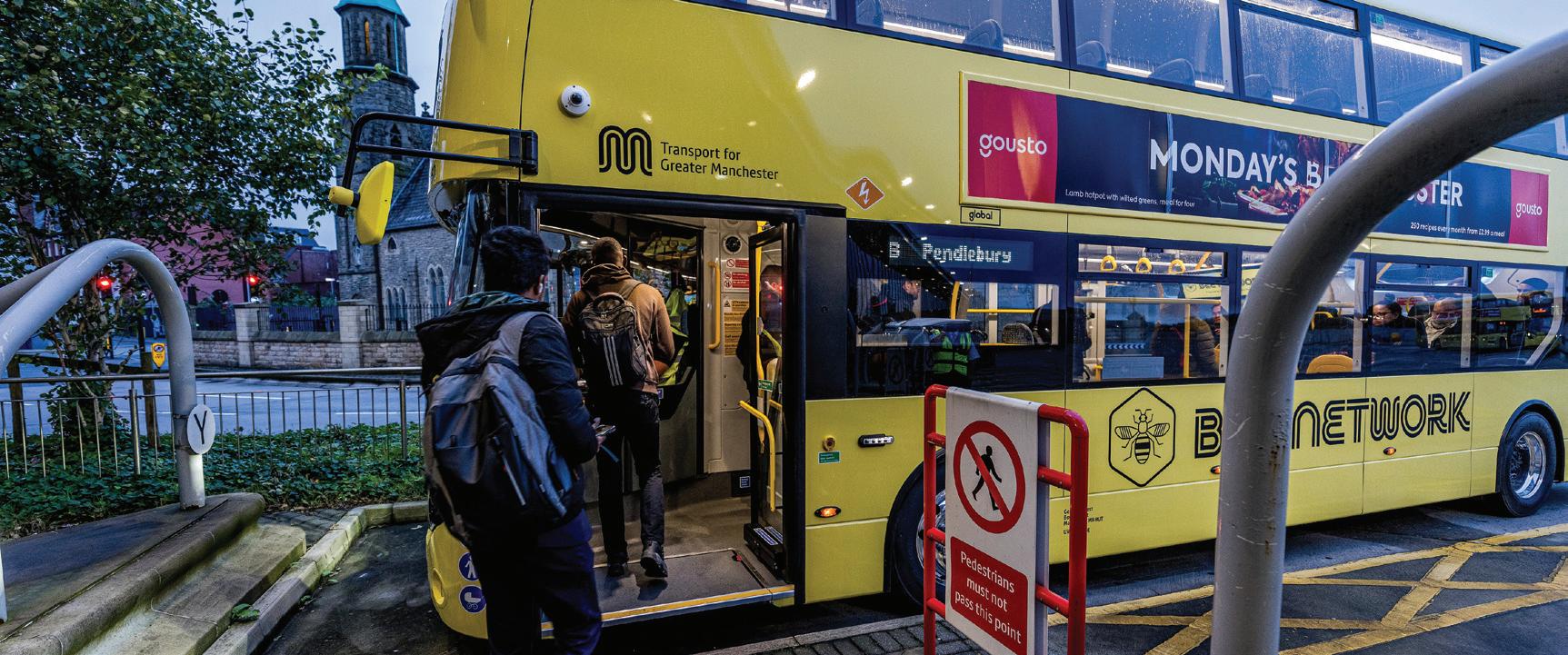
Norman Baker, from Campaign for Better Transport, commented: “This ragtag and bobtail selection of bits and pieces - some of which no doubt have merit - will not compensate for the hammer blow that has been delivered today. By cancelling the Northern leg of HS2, the prime minister has taken much needed rail investment and ploughed it into yet more roads.”
Why
isn’t integration
ISSUE 298 6 OCTOBER 2023 NEWS, VIEWS AND ANALYSIS FOR A SECTOR ON THE MOVE
“Our plan will drive far more growth and opportunity”
Rishi Sunak
a priority?
NORMAN BAKER: PAGE 16 raised at Great Transport Debate
Issue
12
LCR
franchising
reveals support for change
Huge support for
bus
Consultation
03
thinking
its very worst
communities need
the
for
New CEO for Stagecoach
Short term
at
Norman Baker on the PM’s policy shift 16 Rural
railways Nick Richardson on
case
support 22
NEWS COMMENT CAREERS
Clare Miles succeeds Martin Griffiths 26
COMMENT NEWS EXTRA FORTEVERYNIGHT
BEE NETWORK BEGINS Passengers board one of the first of Manchester’s franchised bus services. Go North West and Diamond Bus mobilised the first services under the city’s new Bee Network. See pages 10-11 for the full story
Whichever way thereu-turn is investment
I am trying to remember transport policy u-turns like the ones we have seen this week, but I can’t. The prime minister’s Plan for Drivers is a giant leap backwards. It’s divisive, pitching ‘motorists’ against ‘non motorists’ - and forgetting that those who drive are also public transport users, cyclists and pedestrians. Reducing bus lane operational hours contradicts policies laid down in England’s National Bus Strategy, which aimed to create bus priority measures similar to those in London. Misrepresenting 15-minute cities is just sinister. Hopefully this document will be forgotten as hastily as it was cooked up.

This u-turn was followed by another - cancelling of HS2 north of Birmingham. There’s no denying that the costs have spiralled, but the government also sought to argue that there is less demand for rail travel since Covid - but East Coast intercity operator LNER and others are actually carrying more people. The good news is that “every single penny” of the £36bn saved is to be reinvested in transport, although some of it is earmarked for new road building projects.
So, regardless of the u-turn, the direction of travel remains towards increased investment in transport. Those who want to remain positive can reasonably hope that the sustainable transport schemes that benefit from this new wave of invesment can themselves enhance the case for future investment. And, additionally, perhaps a future government will resurrect HS2 Phase 2 and finish the job.
HAVE YOUR SAY Contact us with your news, views and opinion at: editorial@passengertransport.co.uk
IN THIS ISSUE
20
WE NEED INCLUSIVE LEADERSHIP
OctobermarksBlackHistory
Month,anopportunitytobuild understandingandbridge, says Nafisa Nathani “Wemay experiencetheworldindifferent ways,butweneedtolistentoeach other,”sheadds.
14
130 ELECTRIC BUSES OPERATING IN C OVENTRY
The£140mflagshipprojectto createtheUK’sfirstall-electric buscityby2025hastakenamajor stepforwardwithNationalExpress Coventrynowoperating130new double-deckerzero-emission, all-electricbusesinthecity.

24 WHY FRANCE’S ENERGY SECTOR LEADS THE PACK Ahighly-profitableflagshipoiland gascompanyandlowcarbonenergy independencethatmostdeveloped nationswoulddiefor-Franceseems tohavepulledofftheunthinkable. “FrancehasdonewellintheEnergy WorldCup,”says James Spencer
25
D ON’T JUST TRIM HS 2 - SCRAP P HASE 1 TOO GreatMinsterGrumbles:OurWhitehall insiderimagineswhat’sgoingon insidethemindsofthemandarinsat GreatMinsterHouse,homeoftheDfT. “Havinga‘highspeed’railwaythatonly getsyoufromLondontoBirmingham soundsabitdaft,doesitnot?”
REGULARS
ORGANISATION PAGE Aircoach 8 AlexanderDennis 10-11,14 BeeNetwork 1,8,10-11 BusinessTravelAssociation 12-13 BYD 10-11,14 CampaignforBetterTransport 1 CMAC 12-13 CPTScotland 4 CPT(UK) 12-13 EasternScottish 5 EdinburghTramInquiry 7 FirstBusManchester 8 FirstLeicester 8 Go-AheadGroup 10-11 GoJauntly 12-13 GoNorthWest 1,10-11 LiverpoolCityRegionCA 3 LNER 6 LothianBuses 5 LothianCountry 5 McGill’sBusGroup 5 Mellor 8 NationalExpressCoventry 14 RailDeliveryGroup 12-13 Rotala 1,8,10-11 Ryze 14 SizewellC 14 ScotRail 6 StagecoachGroup 4,26 StagecoachManchester 10-11 TransportFocus 8,9,12-13 TfGM 8,10-11 TIE 7 TSSA 6 UKTram 12-13 VolvoBus 10-11 WestYorkshireCA 3 Wrightbus 14
editorial@passengertransport.co.uk
PASSENGER TRANSPORT PO Box 5496, Westbury BA13 9BX 020 3950 8000
passengertransport.co.uk Telephone:
3950 8000 Managing Editor & Publisher Robert Jack Deputy Editor Andrew Garnett Contributing Writer Rhodri Clark Directors Chris Cheek, Andrew Garnett, Robert Jack OFFICE CONTACT DETAILS Passenger Transport Publishing Ltd PO Box 5496, Westbury BA13 9BX, UNITED KINGDOM Telephone (all enquiries): 020 3950 8000 EDITORIAL editorial@passengertransport.co.uk ADVERTISING ads@passengertransport.co.uk SUBSCRIPTIONS subs@passengertransport.co.uk ACCOUNTS accounts@passengertransport.co.uk Passenger Transport is only available by subscription. Subscription rates per year; UK £140 (despatch by Royal Mail post); Worldwide (airmail) £280 The editor welcomes written contributions and photographs, which should be sent to the above address. All rights reserved. No part of this publication may be reproduced in whole or in part without the publisher’s written permission. Printed by Cambrian Printers Ltd, Stephens & George Print Group, Goat Mill Road, Dowlaid, Merthyr Tydfil CF48 3TD © Passenger Transport Publishing Ltd 2023 ISSN 2046-3278 SUBSCRIPTIONS HOTLINE 020 3950 8000
PASSENGER TRANSPORT editorial@passengertransport.co.uk forename.surname@
020
NEWS 03 NET ZERO 14 COMMENT 16 ENERGY MARKET REPORT 24 GRUMBLES 25 CAREERS 26 DIVERSIONS 28
CONTENTS 02 | 6 October 2023 www.passengertransport.co.uk
Robert Jack Managing Editor
Overwhelming support for bus franchising
Liverpool City Region consultation sees 70% support reform plans
REGULATION
A comprehensive public consultation on the future of buses in the Liverpool City Region has overwhelmingly backed bus franchising.
Over a 12-week period, more than 6,000 local residents, as well as stakeholders, bus operators, and local businesses, provided their input into the proposals.
The findings, analysed by the combined authority in conjunction with transport consultants AECOM, indicate that approximately 70% of respondents are in favour of a franchised network as a means of having a positive impact on future bus improvements.
A detailed summary of the consultation responses was due to be presented by combined authority officers this week. The
WEST YORKS TO CONSULT
Bus franchising plans move forward
REGULATION
In a decisive move last week, members of the West Yorkshire Combined Authority approved plans to launch a public consultation on bus reform plans which could lead to a franchised bus network.
A bus franchising assessment, which has been independently audited, has already concluded that franchising is the combined authority’s preferred option. The decision to press ahead with
report concludes that, among the available options, franchising presents the most promising avenue for the combined authority to fulfill its objectives. These objectives include delivering faster and more reliable journeys, establishing a comprehensive integrated bus network, simplifying ticketing, offering competitive fares, and transitioning to an emission-free fleet. The combined authority said that all of these ambitions are already outlined in the region’s
Bus Service Improvement Plan.
Mayor Steve Rotheram said he was grateful to all those who participated in the consultation process. “If it’s made one thing abundantly clear, it’s that buses matter to local people,” he added.

“Around 82% of all public transport journeys are taken by bus in our region - that’s 400,000 journeys every day. They’re a vital public service that connects people to opportunity and to each other. For far too long, passengers in our area have been forced to contend with a second-class service that’s too confusing, too expensive and too unreliable.
“Our bus network is broken and residents want it to be fixed. I won’t accept a public transport system that leaves behind the very people who need it most. The public have made their feelings loud and clear. Fixing the bus network is central to my ambition to deliver an integrated, Londonstyle transport network.”
If combined authority members approve the plans, the Liverpool City Region would become the second region after Greater Manchester to franchise its local bus network. It follows the launch of the first phase of the franchised Bee Network in Greater Manchester last week.
Under the Liverpool City Region’s proposals, the bus network would be integrated with the Merseyrail network, with ticketing that the combined authority described as “simpler and more convenient”. Daily fare caps would ensure passengers would always pay the cheapest fare across the whole network.
It is expected that if members approve the proposals, there would be a three-year transition period to allow improvements, such as bus priority improvements and the reintroduction of bus lanes in Liverpool. The latter would see former Liverpool mayor Joe Anderson’s controversial decision to axe almost all of the city’s bus lanes in 2014 reversed.
The first franchised services would begin in St Helens in 2026 as part of a phased introduction across the wider region.
a consultation comes despite local bus operators offering further concessions with an improved partnership-based alternative.
In a briefing to combined authority members, head of bus reform Alexander Clarke revealed that to this end an Enhanced Partnership Plus (EP+) option had been included as an alternative to the existing Enhanced Partnership (EP) and franchising options and included in the franchising assessment.
“The assessment makes clear that the EP+ offers significant improvements and advantages beyond the existing EP,” he said. “However it also acknowledges
that delivering it remains subject to further and ongoing operator agreement and establishment of delivery mechanisms.
“Furthermore, the EP+ as modelled does not negate against the increasing public sector funding needed to support the sector over time, a challenge which applies to all reform options.”
Commenting on the decision by members to press ahead with the consultation phase, Simon Warburton, WYCA’s executive director of transport, said the move was “a big step forward on our journey towards a better-connected West Yorkshire”.
“Buses provide a vital public service, but our analysis shows that the way they are run needs to change to achieve our ambitions for better buses,” he added. “The consultation will give people and organisations from across West Yorkshire and beyond a chance to have their say on our proposals.”
More details on the consultation, which is expected to commence within days, will be made available in the coming weeks. WYCA has also confirmed that it is expected that Tracy Brabin, the mayor of West Yorkshire, will make a final decision on whether to proceed with a franchised network in spring 2024.
www.passengertransport.co.uk 6 October 2023 | 03
Rotheram: ‘Our bus network is broken’
“If it’s one thing abundantly clear, it’s that buses matter to local people”
‘We will stand firm, if you stand firm’ - Hyslop
Rishi Sunak is reining in policies that prioritise public transport over car use - but Scotland’s transport minister won’t be following his lead
POLICY
The Scottish Government has no intention to follow the lead of prime minster Rishi Sunak in constraining policies that seek to reduce car journeys in favour of sustainable transport. Instead transport minister Fiona Hyslop sees an opportunity to “steal a march” on her colleagues south of the border and she urged Scottish politicians to “stand firm”.
Hyslop issued this rallying cry at the CPT Scotland Conference in Glasgow last week. Inspired by the Conservative victory in the Uxbridge by-election, a result that was linked to London’s ULEZ scheme, Sunak’s government this week published a ‘Plan for Drivers’ that limits the powers of local authorities to prioritise buses. CPT Scotland director Paul White asked whether this makes it harder to sell pro-bus policies to Scottish voters or whether it was an opportunity to get ahead.
“I think it’s an opportunity to
‘NO QUICK FIX’ FOR UNDER-22S VANDALS
Legal provisions
prevent
passes being withdrawn
ANTI-SOCIAL BEHAVIOUR
Young people who behave antisocially cannot easily have their free bus travel entitlement withdrawn, says transport minister Fiona Hyslop. In January 2022, the Scottish Government introduced free bus

steal a march,” Hyslop responded.
“I strongly believe that transport is about people and places, rather than the vehicles
I think if we sell that message more, I think we will take people with us on this journey.
“I think we’ve all got to stand firm. I would appeal to the politicians in the room, the councillors in particular, that actually our strength will be in our collective approach.”
Hyslop is optimistic that the political consensus on sustainable transport will not fracture in
Scotland, and meetings with councillors from other political parties have reassured her of that.
She said: “They need to be leaders, and I’m sure many of them are, I know many of them are, in taking that message forward.”
Hyslop said that measures like bus lanes and bus gates are essential in order to make buses a reliable alternative to using cars.
“We all have a job to do to sell that,” she said. “We will stand firm, if you stand firm ... Not just the sector, but the political leaders that are in this room and across
Scotland, because I do think that the weight of public opinion is ahead sometimes of our politicians and they expect us to happen.
“There might be temporary resistance, and there might be the voices of doom - and there’s always the media ... Sometimes if you do the right thing you just have to stay firm, and that’s what we intend to do.”
The warm words from the Scottish Government on bus priority measures have not been matched by implementation. In 2019, in response to pressure from the bus industry, the Scottish Government announced a gamechanging £500m Bus Partnership Fund for infrastructure schemes designed to speed up bus journeys, and committed to investigating managed motorways in Glasgow to provide priority lanes for buses.
In response to a question from former Stagecoach director Robert Andrew, Alison Irvine, interim chief executive of Transport Scotland conceded that progress on the Bus Partnership Fund had been “disappointing” and she challenged everyone to think about how bus priority schemes can be sold to the public. She said that the commitment to managed motorways on the M8 remained and that it will be “transformational”.
travel for those aged under 22, and since then 84 million free journeys have been made via the scheme. While welcoming the scheme, some bus operators have noticed a significant increase in vandalism and anti-social behaviour.
At last week’s CPTScotland Conference in Glasgow, Graeme Macfarlan, commercial director for First Bus Scotland, asked Hyslop whether the government is considering any kind of sanction if operators can identify perpetrators.
“It’s beyond tomfoolery,” he said. “We are talking fire-raising. Its public order. It’s public health.”
Hyslop responded: “The vast majority of young people travel responsibly and they are the customers of today and the future, and I think they should be recognised and valued for that. But there are a small minority that our causing difficulties and I have had contacts not just from the sector, itself but also other politicians as well.”
She continued: “The underpinning
legislation for the concessionary travel does not allow us to withdraw the card. We wouldn’t want to withdraw the card because it’s got other passported issues - free school meals, a whole range of things. I have asked whether the transport element could be switched off ... But I think it comes back to the legal provisions that would prevent us legally, for example if we got to legal challenge from a young person or a parent.
“So I think there’s more to it than a quick fix solution.”
NEWS ROUND-UP 04 | 6 October 2023 www.passengertransport.co.uk
“Sometimes if you do the right thing you just have to stay firm, and that’s what we intend to do”
Fiona Hyslop
McGill’s confirms axe for Eastern Scottish
McGill’s pulls the plug on business despite significant investment
NETWORKS
McGill’s has announced the closure of most of its Eastern Scottish-branded operations in West Lothian, which were acquired from First Scotland East in September 2022.
The company, which is now the UK’s largest independentlyowned bus operator, said that since the acquisition of the business it has poured over £4.5m into Eastern Scottish in a bid to turn things around.
“Despite this substantial investment - a mixture of one-off investment and mainly ongoing subsidy from McGill’s Group and its owners - McGill’s Eastern Scottish has faced constant challenges on a number of fronts,” said the company in a statement.
The move will affect the company’s Livingston depot which has been battling acute driver shortages amid a long-term decline in patronage for some

COMMUNITY BUS FUND LAUNCHED
Scheme’s focus is on rural transport poverty
FUNDING
The Scottish Government has launched the Community Bus Fund (CBF) to facilitate Local Transport Authorities in implementing the bus service options outlined in the Transport (Scotland) Act 2019.
Over £5m in funding has been allocated for the first year of the programme. A focus on greater
time. It also faced stiff head-tohead competition from Lothian’s Lothian Country operation, a business that McGill’s refused to name but described as “a nearby publicly subsidised operator, which entered the local market several years ago”.
Additionally, McGill’s claimed increased competition resulting
from the electrification of the main rail routes between Edinburgh and Glasgow through Eastern Scottish’s territory, plus roadworks, diversions, and growing congestion on routes into Edinburgh had worsened the business’s financial position.
The operator’s core services between Livingston and Edinburgh, which were operated in competition with Lothian Country, will be withdrawn from October 15, A handful of services in Livingston will be withdrawn from December 2, but talks continue with the local authority about the future of these services.
challenges that existed for the business in West Lothian when we took over late last year and throughout that period, we have strived to make changes that might place the operation onto an even keel in the medium to long-term,” said McGill’s chief executive Ralph Roberts.
“However, despite investing around £4.5m in Eastern Scottish operations, we have now come to the conclusion that the ongoing losses are simply unsustainable. Inflationary pressures have meant costs have been rising substantially, at the same time revenue is continually slipping, with passenger numbers showing long-term decline - not helped by significant competition.”
Ralph Roberts
support is directed toward rural local authorities, acknowledging their distinct challenges compared to urban areas.
The CBF aims to target rural areas, especially low-income individuals heavily dependent on buses. Its goals encompass enhancing service access, fostering integration, innovation, and conducting pilot projects to explore the Act’s provisions.
The £5m capital funding component is allocated to local authorities based on population
The only routes facing a reprieve are three tendered services that are operated on behalf of The City of Edinburgh Council. McGill’s has confirmed these will continue. Additionally, the Bright Bus Edinburgh opentop sightseeing operation, which is based at Livingston, will remain continue. The depot’s FlixBus express coach commitments will also be maintained.
“We were fully aware of the
and transport poverty levels in their regions, with a focus on enhancing rural public transport quality. It’s worth noting that Highland and Fife stand out in this regard, receiving the highest allocations from the CBF, with £547,000 and £478,000, respectively.
A further sum of £0.75m in resource funding is available to local authorities as a ‘pathfinder-style’ project. This funding is intended to support local authorities in conducting initial feasibility and preparatory work. It will be allocated
McGill’s said it would enter into consultation with staff and union representatives at Eastern Scottish but said it was committed to avoiding redundancies where possible.
Roberts continued: “We believe that we have done all we can to make our West Lothian operation work, but we need to recognise that with the challenges that exist, we have fallen short. Too many operators serving too few customers for too long has destabilised the marketplace in West Lothian.”
on a first come, first served basis.
“The Community Bus Fund is a great example of how partnership working can benefit people right across Scotland,” said Scottish transport minister Fiona Hyslop.
“This complements our broader package of long term investment in bus including support for bus priority infrastructure and encouraging a shift to zero-emission buses, together with the enhanced suite of options for local transport authorities to improve services according to their local needs.”
www.passengertransport.co.uk 6 October 2023 | 05
“We have now come to the conclusion that the ongoing losses are simply unsustainable”
MPs set out tests for minimum service levels
Transport committee produces criteria for controversial legislation
INDUSTRIAL RELATIONS
The parliamentary Transport Select Committee has published a new report outlining key criteria of what it thinks future government regulations on minimum service levels during industrial action should look like.
The Strikes (Minimum Service Levels) Act, which became law earlier this year, grants ministers the authority to establish these regulations. However, the Department for Transport has yet to disclose the specifics about how these regulations will function in reality.
Committee chair Iain Stewart expressed concern that many of the witnesses the committee
EXTRA SUNDAY TRAINS AT LNER
Move comes in response to robust leisure growth
GROWTH
Train operator LNER has responded to increasing demand from leisure travellers by announcing extra Sunday services between Yorkshire and London. The company has noted a surge in Sunday travel, with a 30% increase in passengers at LNER when compared to 2019.

To accommodate this rise in demand, LNER will introduce three additional Sunday services in its December timetable change: two between Leeds and London King’s Cross and one between Doncaster and London. LNER will also provide more seating capacity by deploying
had heard evidence from had yet to receive any clarity from the government about how minimum service levels might work, how routes should be prioritised, how safety could be guaranteed and which staff might be needed.
“It became apparent that the government needs to make the first move,” Stewart added. “Only then will stakeholders be able to feed back on the practicalities, so that regulations can be fine-tuned and plans drawn up.”
The committee’s recommendations include ensuring the minimum service matches previous strike day levels with a focus on safety. Flexibility in regulations is also crucial to accommodate various industrial action patterns, with pay and conditions adjusted for those providing the minimum service.
longer trains on eight existing Sunday services. The current fivecarriage trains will be replaced with nine or ten-carriage ‘Azuma’ trains serving destinations such as Leeds, Harrogate, and Lincoln. Further expansion is expected in 2024.
“The data shows more customers are travelling with LNER at weekends, with Sundays proving especially popular,” said LNER managing director David Horne. “Our plans will provide more than 3,000 extra seats from December, while also improving the connectivity for many of our destinations between London and West Yorkshire on Sundays.”
Rail minister Huw Merriman described the move as “a win for passengers”. “I’m delighted to see LNER taking this responsive approach,” he added.
Improved resilience is necessary to cover for specialised personnel exercising their right to strike.
The minimum service should also consider regional and local travel patterns, ensure accessibility, and provide support for passengers with accessibility needs. Industries like the nighttime economy that can’t adopt flexible working during strikes should be protected. Meanwhile, MPs conclude clarity is needed for freight access, with governmentindustry collaboration on prioritised routes.
The committee also recommends specific criteria for evaluating the success of these regulations once implemented. These include preventing prolonged or increased industrial disputes and ensuring passenger satisfaction on strike days is
greater than at present.
Passengers should also have access to clearly communicated information about service operations and greater advance certainty about travel during strikes. In the long term, the regulations should foster effective cooperation and better working relationships between rail unions, the industry, and the government.
Rail minister Huw Merriman said as an example that during rail strikes in January, about 20% of the network was able to run. MPs expressed concerns that there may be unintended consequences from minimum service, such as poor communication causing high demand for limited services, novel union protests, and reduced reliability during strikes.
However, the report has drawn a blunt response from trade unions. The TSSA union described it as “a belated attempt to make unfair and undemocratic legislation look palatable”. “The public won’t be fooled,” added joint interim general secretary Peter Pendle.
NEWS ROUND-UP 06 | 6 October 2023 www.passengertransport.co.uk
PEAK-TIME FARES AXED Peak-time rail fares have been scrapped on ScotRail services as part of a six-month pilot scheme. The train operator said one of the most significant impacts of the pandemic was to radically change the commuter market, with a significant drop in the number of people travelling during the traditional peak times. That market is only 70% of what it was before Covid-19 and it is hoped the trial will stimulate growth.
Tram inquiry lifts the lid on project’s failures
Edinburgh Tram Inquiry, which was not without its own controversy, concludes ‘litany of avoidable failures’ contributed to project’s woes
GOVERNANCE
The public inquiry into the troubled Edinburgh Trams project has determined that the significant delays and cost overruns were the result of a series of preventable failures.
Initially planned with a network of three lines, when trams finally began running in 2014, five years behind schedule, they operated on a single 14km route, covering only a portion of one of those lines. The tram fleet was excessively large because it had been ordered with the entire network in mind. Efforts to lease surplus trams to other operators, including London Trams, proved unsuccessful.
The inquiry itself has proven to be not without its own problems. Chaired by Lord Hardie, it was launched nine years ago, incurring costs of £13.1m and involving the
examination of over three million documents. The resulting report spans 961 pages and makes 24 recommendations.
The primary conclusion places responsibility on Edinburgh City Council, as well as its development company, TIE (originally Transport Initiatives Edinburgh). The report cites a lack of effective collaboration between TIE, the council, and contractors, which led to growing impatience.
Speaking in a video message to accompany the report’s publication, Hardie said TIE’s failures were the principal cause of delays and ballooning costs for the project. He also noted that the council must also share principal responsibility with TIE for the delays in design.
Hardie acknowledged the Scottish Government’s
Underlying problems contributed to issues
Inquiry highlights where tram project went wrong
The Edinburgh Tram Inquiry has concluded the principal causes of delays and cost overruns to the project as being due to the following:
Departure from the procurement strategy: TIE (originally Transport Initiatives Edinburgh) deviated from the original procurement strategy
aimed at mitigating project risks.
Lack of collaboration: TIE failed to foster collaborative efforts with the council and other project partners.
Design delays: Significant delays in design production have been attributed to subpar performance by contractor Parsons Brinckerhoff.
recognition of its mistake in withdrawing oversight responsibilities from Transport Scotland officials who had been tasked with protecting the public purse. This oversight was withdrawn in 2007 by then finance secretary John Swinney and the report concludes it led to a loss of expertise on the project that only exacerbated the problems.
Hardie’s recommendations include the consideration of new legislation to enable civil and criminal action against individuals or companies knowingly submitting reports with false statements to councillors. Other recommendations include a review by Scottish ministers of public inquiries to determine cost-effective methods for avoiding delays and maximising the benefits of public expenditure on major projects.
Additionally, the report suggests the establishment of a joint working group involving officials from Transport Scotland and representatives from the Convention of Scottish Local Authorities (COSLA) for future light rail projects. It also advises that procurement strategies for future projects adequately address uncertainties related to utilities and redundant equipment locations.
Hardie concluded: “What is clear from the inquiry’s work is that there was a litany of avoidable failures on the parts of several parties whose role was to ensure that public funding was spent effectively to the benefit of Scotland’s taxpayers and the efficient delivery of the Edinburgh Trams Project.”
He noted that poor management and a failure to take responsibility on a significant scale had a lasting impact on the lives of Edinburgh residents and the city’s reputation.
Mairi McAllan, Scotland’s cabinet secretary for transport, appeared to accept the conclusions, but took aim at the cost of the inquiry itself.
Cost underestimation: TIE underestimated project costs and over-shouldering of risks for the scheme.
Role ambiguity: A lack of clarity regarding the responsibilities of various parties involved in the project’s complex management.
Oversight gap: It was a missed opportunity for oversight when the Scottish Government withdrew Transport Scotland officials from project involvement.
“The Scottish Government places the highest importance on the efficient spending of public money,” she said. “It is why the public inquiry was set up and given statutory powers to thoroughly investigate matters.
“It is also why we committed significant resources to diligently support the inquiry and to engage meaningfully and openly with it.
“However, the inquiry took too long, was too costly and in some instances the evidence heard does not support the conclusion drawn.”
McAllan said she will make a more detailed statement about the conclusions to the Scottish Parliament in due course.
www.passengertransport.co.uk 6 October 2023 | 07
Rotala managers seek to take group private
AIM-listed bus group confirms it has received takeover approach

ACQUISITIONS
Shares in AIM-listed bus group Rotala have soared after it received an approach from its senior management team that would value the company at around £19.4m.
The proposed offer comes from Simon Dunn, Rotala’s chief executive, alongside his father Bob Dunn, who serves as the managing director of Rotala’s operations in the north west of England, and chairman John Gunn. They have signalled their intention to potentially extend an offer of 63.5p per share for the shares they do not presently own, with the trio currently holding a combined 37.6% stake in the
BUS SATISFACTION IMPROVEMENTS
Survey finds high levels of passenger
satisfaction
CUSTOMER SERVICE
A new report by Transport Focus has revealed that eight out of 10 bus passengers expressed satisfaction with their most recent journey.
This mid-year update from the Your Bus Journey user survey by the watchdog collected passenger feedback on over 14,000 journeys across England. Transport Focus said the data acts as a crucial metric for Bus Service Improvement Plans. Passengers consistently reported high satisfaction levels with bus drivers, with an overall satisfaction rate of 85%. Past research indicates bus driver behaviour significantly
Birmingham-based bus group.
To evaluate the potential offer, Rotala has established a committee consisting of three independent directors. This committee comprises Graham Spooner, serving as the nonexecutive deputy chair and senior independent director, independent non-executive director Graham Peacock, and
Kim Taylor, Rotala’s group finance director.
The independent directors have conveyed their inclination to recommend the potential offer to Rotala shareholders if a firm intention to make an offer is officially announced. The Dunns and Gunn are obligated to make this announcement by no later than 5pm on October 17. That deadline can be extended with the consent of the takeover panel.
Rotala was formed in 2005 and has grown through the acquisition of local coach and bus operations since then. Recent acquisitions have included the bus operations of Johnsons Coaches and Claribels and Staffordshire-based Midland Classic. The group has also secured small franchise contracts in the first round of bus franchising in Greater Manchester.
FIRST BUS SHOPS LOCAL FOR BUSES
Mellor wins Rochdale Bee Network minibus contract
VEHICLES
First Bus Manchester has announced it is buying local for the bus services in Rochdale it will run as part of the Bee Network from next March.
The operator was named as the winner of the town’s two small franchises earlier this year with a peak vehicle requirement of 32 buses (PT292). It has now announced that in partnership with Transport for Greater Manchester it has selected Rochdale-based manufacturer Mellor to supply 17 Strata Plus minibuses for the contract.
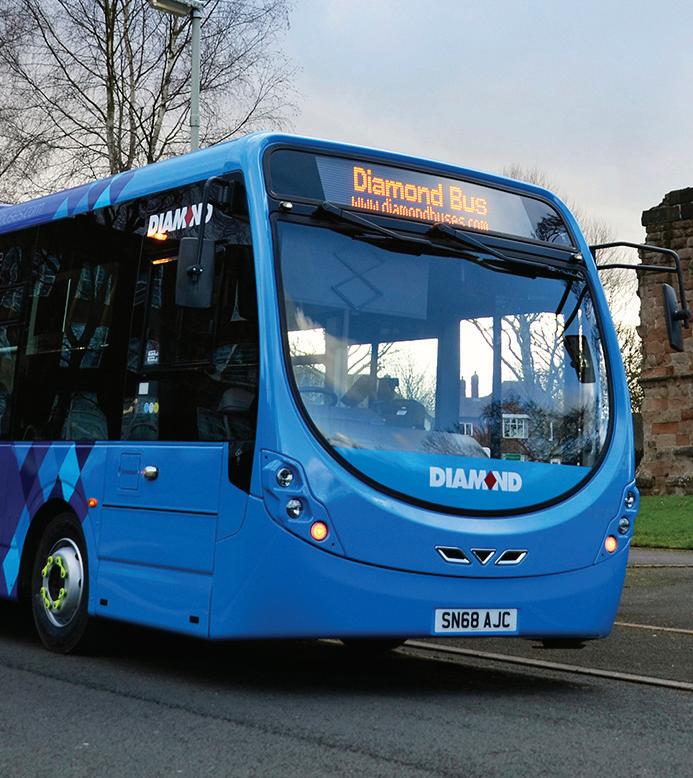
Mike Watson, the First Bus director leading the mobilisation of the contracts, said: “We’re delighted to announce this order with Mellor and look forward to seeing the first vehicles coming off the production line. First Manchester is determined to help build the economy and link key communities.”
influences the overall experience.
In terms of value for money, 67% of passengers expressed satisfaction with their fares, with nearly 40% indicating a very high level of satisfaction. Transport Focus said these positive responses are noteworthy in the current cost of living climate and when many operators are making service changes. Initiatives like England’s £2 fare cap have been positively received. Despite these positive findings, there are variations among the 35 participating areas, with notable differences in certain aspects. For instance, passenger satisfaction with wait times at bus stops ranged from 57% at its lowest to 84% at its highest, highlighting a significant variance of nearly 30 percentage points between regions.
Rotala was formed in 2005
AIRCOACH TO LEICESTER First Bus has brought its Aircoach brand from Ireland to England with the launch of a new route connecting Leicester and Birmingham Airport. Tickets for the service start at £9 one way with unbooked seats available for those travelling on a turn-up-and-go basis for £16. Services operate hourly, 24 hours a day, seven days a week.
NEWS ROUND-UP 08 | 6 October 2023 www.passengertransport.co.uk
Further BSIP+ funding as study probes fare cap
Richard Holden confirms unchanges BSIP+ funding for 64 English local authorities in 2024/25 as positive results from £2 bus fare cap revealed
PATRONAGE
Transport minister Richard Holden has confirmed that the 64 English local authorities that received Bus Service Improvement Plan Plus (BSIP+) funding earlier this year will maintain the same allocations for the 2024/25 financial year. A further £80m has been allocated to BSIP+ for 2024/25, with the local authorities receiving funding once again free to make their own decisions on how they spend their allocations.
The Department for Transport has confirmed this funding can be used as revenue support for marginal services, introducing new or expanded services, or fare
initiatives, depending on their local area’s specific needs.
“While it is the responsibility of bus operators and local transport authorities to ensure an adequate provision of bus routes, the government continues to work closely with the sector to support local areas in dealing with changing travel patterns while managing pressures on the taxpayer,” it added.
Meanwhile, the government has released findings from a study indicating that the £2 bus fare cap in England has yielded positive results. This study - The £2 Bus Fare Cap Second Interim Evaluation Report - was conducted by consultants Frontier Economics
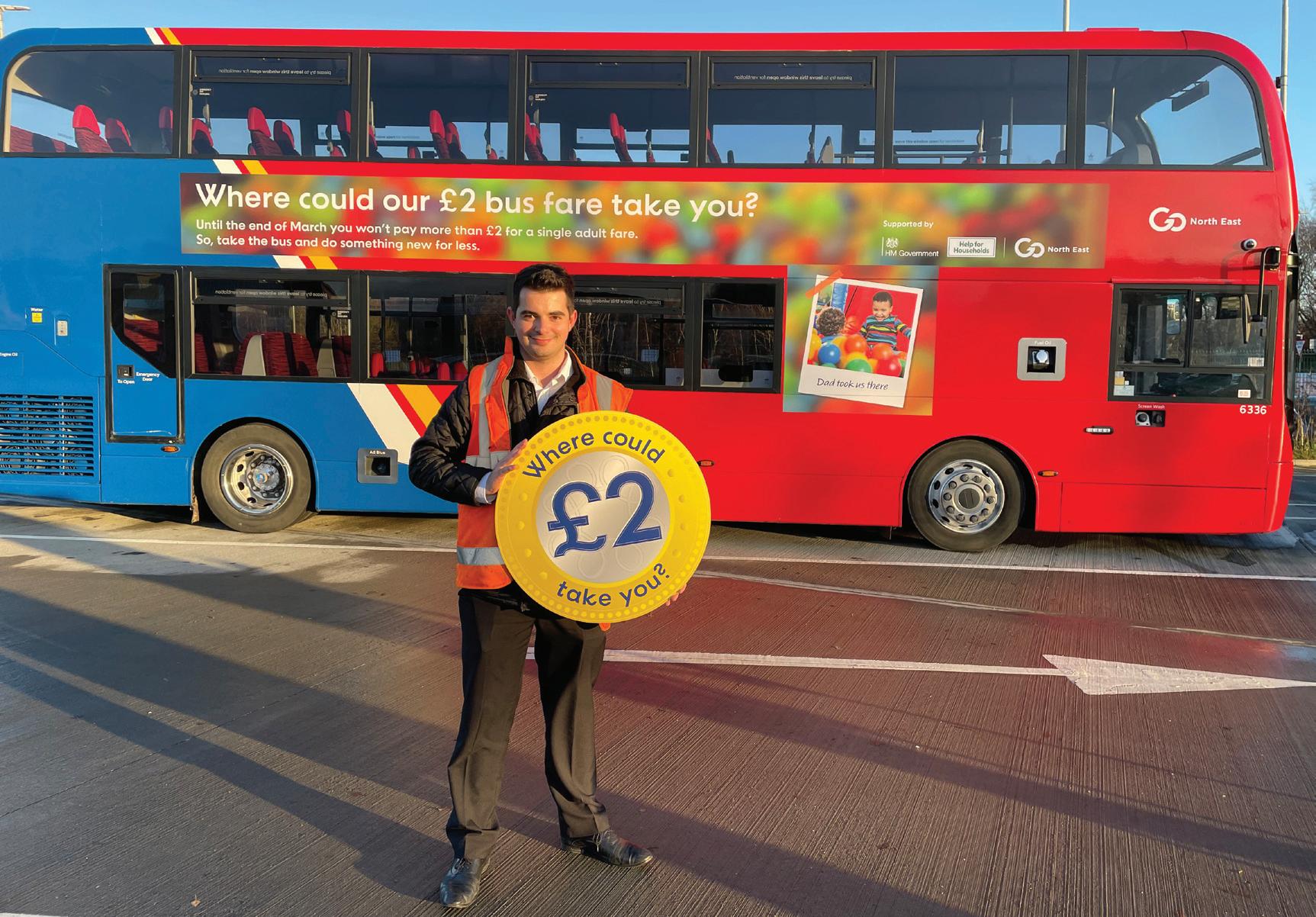
and SYSTRA. It represents the second of two interim reports, with a final evaluation scheduled for early 2024, and outlines outcomes during the scheme’s first two months earlier this year.
The evaluation process relied on information from five different sources: data from Transport for London and bus operators, as well as surveys conducted among 4,000 individuals, both bus users and those who don’t use buses. Additionally, Transport Focus conducted its own survey work as part of the evaluation. To complement this, ticket sales data was obtained from Ticketer.
Preliminary ticket machine data analysis for January and February
2023 suggests a 20% year-onyear increase in bus patronage. Compared to the period before the scheme’s launch in October to November 2022 (excluding holidays), patronage only decreased by 3%, which is less than historical trends.
In January and February 2023, over 50 million single bus tickets were sold, with around two-thirds priced above £2 and thus subject to the fare cap. More single tickets were sold than in 2022, indicating passengers switched for savings. Survey data suggests the £2 fare cap likely boosted or maintained patronage. About one in five aware of the cap used buses more. Of those taking more trips after the cap’s introduction, around a third credited it as the sole reason, while nearly half saw it as the main reason. Approximately 10% of respondents in the second wave of surveys indicated that they had increased their bus travel since the introduction of the cap. This aligns with the findings from Transport Focus in March 2023, where 11% reported an uptick in bus usage. Among those who reported taking additional journeys, 24% did so less frequently than once per week, while 40% added one to two extra trips, and 38% made three to five additional trips each week.
Frequent bus users who travel by bus at least once a week were more likely to report increased bus use since the cap’s introduction. Approximately 30% of second wave panel survey respondents noted that the cap had positively impacted their disposable income and overall expenses. Additionally, eight in 10 respondents agreed that the cap would help with the cost of living, with over four in 10 believing it could save them money, particularly among young age groups.
www.passengertransport.co.uk 6 October 2023 | 09
England’s £2 bus fare cap launched in January
Bee Network launch: a triumph for control?
They said it would never happen, but in the early hours of September 24, Greater Manchester’s first franchised buses entered service. Mayor Andy Burnham’s flagship Bee Network is live, in a process that will see the overwhelming majority of local bus services in Greater Manchester under mayoral control in 2025.
The launch of the Bee Network in Bolton, Wigan and parts of Salford and Bury marked the end of a process that began in late 2014 when thenchancellor George Osborne included bus franchising powers as part of a package of responsibilities for a new, directlyelected regional mayor.
Andrew Fender, the then chair of the Transport for Greater Manchester Committee, hailed Osborne’s decision after years of persistent campaigning and lobbying by local councillors to take back control of their region’s bus service, which was effectively lost with deregulation in 1986.
Bus franchising powers for the new mayoral combined authorities followed in the Bus Services Act. Naturally, Greater Manchester’s plans faced opposition from the big transport operators - so much so that both Rotala and Stagecoach launched court action on the basis of the approach taken by Andy Burnham, who was first
elected as Greater Manchester’s mayor in 2017 and re-elected in 2021. However, it was notable how at times it felt like some operators were just paying lip service to that opposition, perhaps excited about the opportunities franchising could offer their businesses.
One operator who was very much opposed to the franchising plans was Stagecoach. Its rhetoric was particularly fearsome with a sophisticated campaign that blasted the cost to taxpayers of the mayor’s plans. It’s an approach some managers within the operator - perhaps fearful of the antagonistic relationships it was creating with local stakeholders on the back of Burnham’s overwhelming majorities in both
the 2017 and 2021 elections - very quietly admit they felt uneasy about as franchising became increasingly likely to happen.
Burnham hailed the launch of the Bee Network, joining staff from Go North West (GNW), who were the overwhelming victor in the first franchising rounds, plus Christian Schreyer, the chief executive of GNW parent Go-Ahead, in the early hours of September 24 as the operator took control of Rotala’s Bolton depot and Stagecoach’s Wigan depot and they began the task of switching over vehicles to Bee Network control. The mayor defined it as a “coming-of-age moment for English devolution”.

“For nearly 40 years we have
seen worsening services and plummeting passenger numbers on our buses,” said Burnham.
“We’ve had to reckon with a deregulated bus network that cuts vital services that connect communities to jobs, hospitals and opportunities on a whimleaving local leaders with limited budgets to pick up the tab to keep these routes alive. Today marks the end of that era.”
The Bee Network is a springboard to a wider, integrated public and active travel transport network. Vernon Everitt, Greater Manchester’s transport commissioner, said the launch of bus franchising would be a “path to safe, reliable and affordable transport for everyone”.
He continued: “As well as a range of service improvements and new cheaper combined bus and Metrolink fares, this also represents a move towards London-style ‘tap and go’ ticketing when the final tranche of bus franchising is introduced in January 2025. Integration of train and cycle hire payments will form part of this system as soon as possible after that.”

The Bee Network mobilisation marked a culmination of months of preparation by a team of 600 people at GNW and its parent company. The operator has inherited a fleet of 320 buses which will operate 50 routes. As the commercial skills of deregulation give way to the contract management skills of franchising, good performance will be essential. GNW’s finances will rely on securing contract payments and good performance fees from TfGM.
Nigel Featham, GNW’s managing director, wearing Bee Network yellow sneakers and hoodie, described the launch of Bee Network operations as the culmination of many month’s
Mayor Andy Burnham has taken the reins of Greater Manchester’s buses with the launch of the long-awaited Bee Network in Bolton and Wigan
“There is a lot of work still to come. But our goal is to work with the mayor to deliver world class transport for a world class city, Manchester” Nigel
Featham
Andrew Garnett Deputy Editor
10 | 6 October 2023 www.passengertransport.co.uk NEWS EXTRA BEE NETWORK
Buses switched overnight to Bee Network control in Bolton and Wigan
work. “There is a lot of work still to come,” he added. “But our goal is to work with the mayor to deliver world class transport for a world class city, Manchester.”
A total of 550 drivers are required for the Bolton and Wigan large franchises. While the majority have transferred from other operators who lost out on the franchising process, 70 have been hired as part of GNW’s ‘Elite Bus Driver Academy’ training programme. A further 85 have been ‘borrowed’ from sister Go-Ahead bus subsidiaries for a three-month period. Featham said these drivers will tide GNW over while it trains hundreds of homegrown new drivers in Manchester.
It was a sanguine feeling for Stagecoach managers and staff - as well as for those at other operators
who have lost out from the franchising process. As a conga line of Stagecoach vehicles left Wigan depot for dispersal to Stagecoach operations elsewhere in the UK, managers said goodbye to colleagues moving over to GNW, although a handful have opted to stay with the group and transferred to other nearby depots in the wilds of the deregulated landscape.
But Stagecoach can feel bullish - it has triumphed in the second franchising round that will take the Bee Network into Oldham, Rochdale, north Manchester and the remainder of Bury and Salford. Ironically, that process will see it take control of GNW’s Queens Road depot in March 2024. Some wry onlookers suggested that Stagecoach managers appeared to be
observing GNW’s management of the switchover like hawks.
The launch of the network has been backed by some serious investment in new buses by Transport for Greater Manchester. Of GNW’s initial 320-strong fleet in Bolton and Wigan, 102 of them are brand new with 50 of them being fully electric Alexander Dennis/ BYD Enviro400EV double deckers. A further 50 of the same type will follow with the introduction of the second phase of franchising next March. A total of 170 Volvo BZL electric double deckers, ordered by Stagecoach Manchester, will become part of the Bee Network in 2025.
There have been many arguments about the merits and drawbacks of bus franchising,

but in recent years - and certainly since Covid devastated the balance sheets of previously highly profitable bus operations - there has at times felt like an inevitability about it. Liverpool and West Yorkshire are now snapping at the heels of Greater Manchester. Others will follow.
While the North East’s attempts to introduce the erstwhile Quality Contract process a decade ago had elements of farce, one thing is now very certain: the bus franchising genie is well and truly out of the bottle in England’s combined authorities at the very least.
Revolutions have always been formed in the city of Manchester. Is bus franchising yet another case of what Manchester does today, the rest of the world does tomorrow?
The future’s yellow: Andy Burnham sees off the first Bee Network bus
www.passengertransport.co.uk 6 October 2023 | 11
“For nearly 40 years we have seen worsening services and plummeting passenger numbers on our buses”
Why isn’t integrationmulti-modal a priority?

It’s the thing everyone wants but in so many ways it remains elusive. Last week’s Great Transport Debate examined why we can’t join up journeys
Why hasn’t more progress been made to integrate different modes of transport to create seamless door-to-door journeys that rival, or exceed, the convenience of the private car? This was a recurrent theme at last week’s Great Transport Debate in Manchester. This was a brand-new transport event that was billed as being unlike any other. It was the brainchild of CMAC, experts in planned and emergency ground transport solutions, and it brought together executives from the air, rail, bus, micro-mobility, taxi and active travel sectors in Manchester Airport’s Concorde Hanger. Ambitions for the future of transport were debated underneath a Concorde aircraft, a reminder of the ambition and ingenuity of a previous generation. And the debate was co-hosted by two transport experts who have spent their careers moving freely between different modesNeil Micklethwaite, chief operating officer of CMAC Group, and Alex Warner, founder of AJW Experience Group. A passionate plea for greater integration was made by Clive Wratten, chief executive of the Business Travel Association. He argued that the fragmentation of the transport sector was frustrating for travellers, but also unsustainable from an environmental perspective.
“From personal experience, numerous recent trips I have taken using public transport have been far from seamless, not all, but far too many,” said Wratten. “I am confident this sentiment resonates with many of you present here today, and I am also totally confident none of you want this to be the case.
“Currently the industry is highly fragmented, causing unnecessary issues for business travellers ... It is time for change. It is time to make travelling in the UK a seamless experience, Bridging the gaps between different transport modes. We need to foster open dialogue and take meaningful action to build a transport system
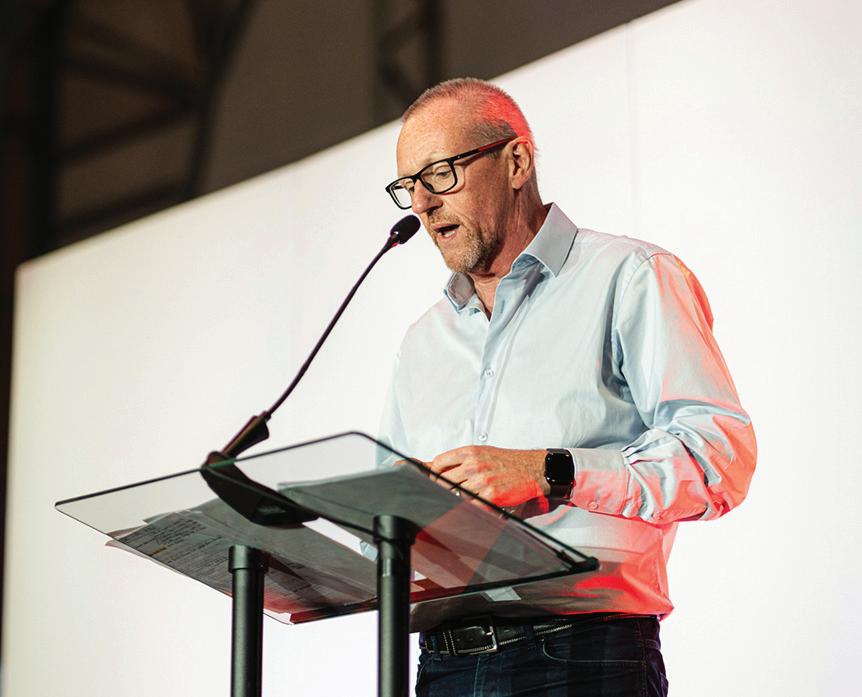
that is user-friendly, efficient and responsive to the needs of those on the journey.
“We need to park competition for the sake of our planet and our economy. To do this it is vital that we prioritise greater collaboration and measurable action. Meetings are all well and good but if we aren’t coming out of them with tangible targets, roadmaps and KPIs, then frankly what are we achieving? Put simply, we can’t have competition without a functioning planet. We need to create an integrated transport network not empty promises.”
Jacqueline Starr, CEO of Rail Delivery Group offered a candid assessment of why greater
integration has not been achieved.
“At the moment multimodal integration en masse, I am speaking on behalf of the industry as a whole, is not a priority,” she confessed. “It’s very much an add-on to conversations.”
She continued: “There is still a lot of competition between modes, and that’s not fostering the type of relationships and behaviours and prioritisation and investment.
“I think there is also, dare I say, a slight behavior and cultural issue also in terms of the appetite to truly address the need and desire and the expectation of our customers now to have that end-to-end experience, regardless of modes.
“And finally I think there is a gap in terms of data and being able to understand that first and last mile piece specifically, and really identify the needs of those customers in a way that really creates a compelling story for us internally to lobby against some of those that perhaps don’t want to respond to that growing customer need.”
James Hammet, managing director of light rail umbrella group UKTram, also sees competition between modes as a barrier to integration. He contrasted this with the seamless experience of booking a package holiday, which might include flights, coaches, taxis, hotels and food: “Everything is all in one and I have paid at one point, so why are we not doing that in transport? It’s doable.”
Jacqueline Starr spoke about some of the work that is being done in the rail industry on issues like fares and ticketing and digitalisation to improve the journey experience, but warned that it is still happening in isolation: “It will take years to develop. It will take more years to deliver, and therefore if we don’t approach that on the basis of
12 | 6 October 2023 www.passengertransport.co.uk
“We need to create an integrated transport network not empty promises”
Clive Wratten, Business Travel Association
Clive Wratten, chief executive of the Business Travel Association
NEWS EXTRA GREAT TRANSPORT DEBATE
Robert Jack Managing Editor
mass integration, this situation remains unchanged for the next five to ten years. So we have to find a way to work together and combine that change now.”
Alex Warner, whose career has spanned Tube, aviation, rail, coach, bus and more, believes that the transport sector exists in entrenched modal silos that need to be broken down. He said that train company bosses often don’t know the bus bosses on their patch, and vice versa - even when they are working for the same owning group.
He asked: “Should the CEOs of the various owning groups seriously earn their money by forcing, right down to frontline managers, through their MDs, the bus and rail companies to talk to each other? This is why they are paid big bucks, surely?”
Nigel Stevens, chair of transport user watchdog Transport Focus, believes that the technology sector can help to join up the transport sector - if the latter does not impede them.
“They are already doing a lot of this work of joining up the dots and at the moment they are held at arm’s length, particularly I would argue in the rail sector where they are seen as the enemy, to a degree,” he said. “Actually if we can get the Citymappers of this world, the trainlines of this world, engaged and control their behaviors through data control, we can actually harness that power and that technology ... It doesn’t matter who owns the customer. It needs to be somebody who can deliver the goods.”
This prompted Neil Micklethwaite to harness the power of techology to pose the following question to the audience: “Can Amazon sell tickets for us?”
“They distribute revenue to individuals in China, distribution companies in the USA, couriers,”
said Micklethwaite. “They all get their money and it goes to the right place.”
Later on, Graham Vidler, chief executive of CPT, suggested that a reality check was needed.
“If I could offer a slightly dissenting view on some of the debate we have had so far actually, I think there’s a question here about priorities and what’s most important to passengers,” he said.
“I think integration is important and will become more important.
I don’t think it’s anywhere near the top of passenger’s priority list at the moment.
Reliability, he said, was top of the wish-list for bus users: “So I think all of our focus, the vast majority of our focus, should be on cracking the things that get in the way of reliability, and in the bus sector that’s a shortage of drivers, it’s unreliable journey times because of congested roads.
Those are the things that are most important right now.
“The commercials will drive integration when it becomes more of a priority for passengers, and
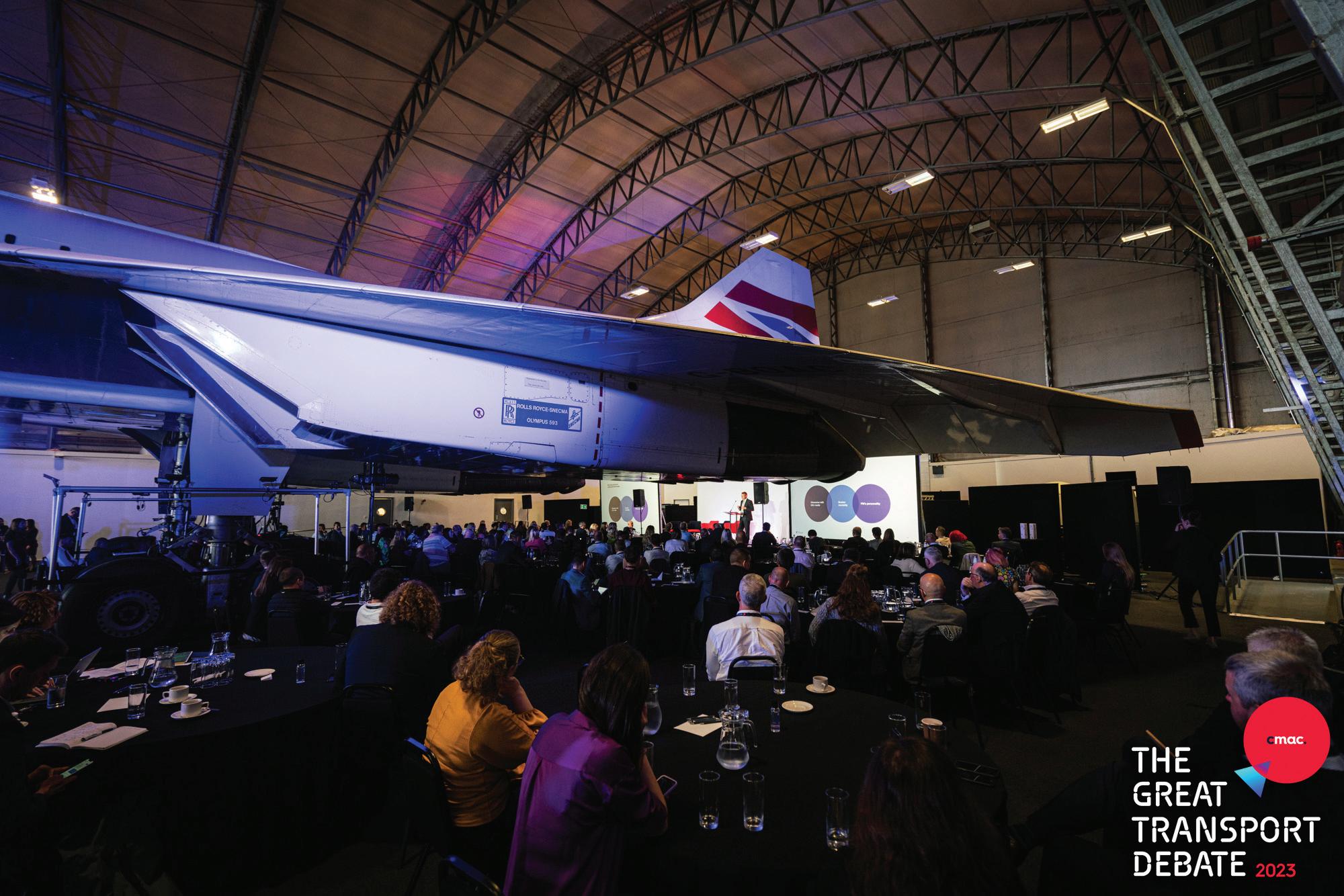
when passengers are demanding that sort of integration.”
It was mid-way through the afternoon and Claudette Anderson, partnerships manager at Go Jauntly, said it was shameful that nobody had yet mentioned walking or cycling in the context of a discussion about multi-modal transport. Go Jauntly is a walking app that has worked with Transport for London, South Western Railway and soon Transport for Wales.
“Walking is the most successful mode of transport and we need to recognise it as a mode of transport,” she said. “If you are a public transport authority or an operator ... You need to be talking about that. You need to be making it very clear that that is part of your journey experience ... You need to be talking about that. You need to be showing that you care about that, and that you know it’s part of a really interesting, fun enjoyable experience for people every day. Nothing makes people more connected to where they are than walking.”
Anderson asked why transport operators and authorities don’t talk more about the environment. “Modal share is a huge part of the nature recovery plan,” she said. “Climate emergency is here. The biodiversity crisis is here. The mental health crisis is here. We are all living through that every day. Are public transport operators too scared to talk about that? Does that make you too woke, or too green? It’s neither of those things, it’s literally happening as we speak. So why aren’t we championing that more?”
Overall it was a stimulating event that perhaps asked more questions than it answered - a rallying cry for others to take up and then thrash out the details. But, before we left we learnt that the majority of the audience had responded positively to Amazon selling becoming a retailer for public transport. Commenting via the Slido audience interaction app, a respondent named ‘Jeff Bezos’ quipped: “Imagine the size of the box for a train ticket.”
ALEX WARNER: PAGE 18
www.passengertransport.co.uk 6 October 2023 | 13
“I don’t think it’s anywhere near the top of passengers priority list at the moment”Graham Vidler, CPT
The debate brought together executives from the air, rail, bus, micro-mobility, taxi and active travel sectors in Manchester Airport’s Concorde Hanger
130 electric buses now operating in Coventry
80% of National Express Coventry fleet is now zero-emission
ELECTRIC BUSES
The £140m project to create the UK’s first all-electric bus city by 2025 has taken a major step forward with National Express Coventry now operating 130 new double-decker zero-emission, all-electric buses in Coventry.
All 130 Enviro400 electric buses are UK-built in Falkirk by Alexander Dennis on a BYD chassis. The buses are powered by renewable ‘green’ energy thanks to solar panels, a second-life battery and charge-point infrastructure all installed at National Express Coventry’s bus depot by electrification specialist Zenobe. The vehicles take four hours to charge and run for up to 175 miles.
To date, National Express Coventry’s electric buses have operated over 2.5 million miles since their first introduction
HYDROGEN BUSES FOR SIZEWELL C
in August 2020, saving 4,000 tonnes of carbon dioxide and contributing towards the achievement of the council’s objectives to reduce vehicle emissions within the city.

The overall project has been funded by a combination of government funding and investment from National Express. In 2021 Transport for West Midlands, which is part of
the West Midlands Combined Authority, secured £50m funding from the Department of Transport to ensure every bus in Coventry is zero emission. Funding was used to replace the city’s bus fleet with zero-emission electric buses along with charging infrastructure.
The latest 130 vehicles are in addition to 10 fully electric double-decker buses introduced
by National Express Coventry in 2020, supported by £2.2m of government funding from the Ultra-Low Emission Bus Scheme.
With 80% of National Express Coventry’s fleet now zeroemission, it marks a significant step forward in Coventry’s mission to promote sustainable transport and create a healthier environment for the community. It also comes after the completion of 1,250 electric vehicle charging sockets in Coventry, contributing to the ongoing improvement of the city’s air quality.
Alex Jensen, CEO National Express UK & Germany, said:
“We’re incredibly proud to play our part in making Coventry the UK’s first All-Electric Bus City ... As we have some of the cheapest ticket fares in England, alongside flexible ticketing, our customers can have the confidence that they are doing their bit for the planet when they ditch the car and travel by bus.
“More people using public transport has significant benefits for society including safer roads, increased access to opportunities, reduced congestion, improved air quality and more space in our cities.”
If the
pilot is successful, 150 buses will be ordered
HYDROGEN BUSES
Bus manufacturer Wrightbus has signed a deal with nuclear power station project Sizewell C that could see up to 150 hydrogen buses operating on the site - making it one of the largest such fleets in the world.
Sizewell C is to order four Hydroliners from the Northern Ireland-based manufacturer to test whether they could be used during the construction of the new nuclear power station.
The Streetdeck Hydroliners, which are expected to be delivered in early 2024, will be part of a pilot scheme to see whether they would be suitable for transporting thousands of workers to and from the construction site near Leiston, Suffolk. Sizewell C will test the operational performance of the zero emission double deck buses. If the pilot is successful, Sizewell C will order up to 150 buses, making it one of the largest hydrogen bus fleets in the world.
Julia Pyke, joint managing director of Sizewell C said: “Once it starts generating, Sizewell C will be one of the biggest generators of low carbon electricity in the country. Our plans
for hydrogen buses show we are determined that the construction of the power station will also be as clean as possible.
“A hydrogen fleet will lower our carbon emissions and reduce the impact of workforce transport on local communities. At the same time, I am excited that we will potentially kickstart a market for this important low carbon fuel in the East of England.”
Jean-Marc Gales, CEO of Wrightbus, said: “The fact that [this pilot] could lead to a fleet of up to 150 hydrogen buses is testament to the potential hydrogen has for both passenger transport and
construction sites. We continue to invest in hydrogen technology as a driver to developing cleaner, more efficient transport solutions.”
As well as using hydrogen for transport, Sizewell C is helping to pave the way for hydrogen-powered equipment to be used on large construction sites. The project is part of a consortium led by Wrightbus’s sister company Ryze which has just been awarded more than £3m of government funding to test a mobile hydrogen refuelling system. If successful, this innovative technology could eventually reduce the need to use fossil fuels in machinery and equipment.
NET ZERO 14 | 6 October 2023 www.passengertransport.co.uk
Alex Jensen (right), CEO National Express UK & Germany and West Midlands mayor Andy Street celebrate 130 National Express Coventry zero emission buses operating in Coventry

Short term thinking at its very worst
In my last column for Passenger Transport (PT296), I observed that it never helps when No 10 or No 11 take too close an interest in transport policy. It gives me no pleasure at all to have been proved right so quickly and so devastatingly.

We had already learned of the decision taken by No 10 to push back the end date for sales of petrol and diesel cars, a decision that infuriated car manufacturers and environmentalists in equal measure.
Next up we were given the Plan for Motorists, a naked attempt to appeal to the worst instincts of the population and scrabble together some votes for the Conservatives at the forthcoming general election.
Dressed up as long-term decision making, this is short-termism at its very worst, a plan not for the future but to take us up to the day after the next election. Survival is the name of the game for Rishi Sunak and the Conservatives, and if British manufacturing, the environment, international credibility and the rest have to suffer, well so be it.
One of the saddest sights of the week has been to see the amiable and decent Mark Harper forced to appear before the cameras at the Tory party conference, like someone in a hostage video, and read out the garbage written for him by No 10.
In announcing that the car driver should take priority over the bus passenger, the government is upending decades of transport policy in this country that has run
through Labour, coalition and Conservative governments, and returning us to the so-called great car economy of the 1970s.
The suggestions in particular that bus lanes should be curtailed and that local authorities should be discouraged from enforcing moving traffic offences come, like so much else in the government these days, straight from the unpleasant and unhinged far right of the Tory party. The same wing that enthusiastically votes to curtail the freedom to demonstrate while encouraging the vandalism of ULEZ-enforcing cameras in London.
Mark Harper and his team have been trying to do the right thing, including capping bus fares. Indeed, the Department for Transport recently and justifiably issued a press release pointing out that bus fares in rural areas have fallen 11% over the last year.
But smooth running is essential if the bus is to attract people out of their cars. Removing bus priority will simply lead to more buses more often being stuck in congested streets along incidentally with all the motorists the PM says he wants to help. And people will take the view that if they are going to be stuck in a
traffic jam, they may as well be stuck in their own car rather than stuck in a bus.
The good news, if there is any, is that the Plan for Motorists talks about reviews, changing guidance and the like. Very little if anything can be forced on local councils before May next year when the general election is widely expected. DfT civil servants, charged with making something palatable out of these fetid ingredients, can be forgiven for taking their time and going slow, in the entirely reasonable expectation that the vast bulk of the package will be junked by an incoming Labour government.
Then on Wednesday came the hammer blow that we had all been expecting - the amputation of what was left of HS2.
The HS2 concept I signed up to, both as Lib Dem transport spokesperson in 2009 and then subsequently as a transport minister, was light years away from where we have ended up. That was for a network of new track, not simply to Manchester and Leeds, but one that had a spur to Heathrow, to discourage internal flights, and a link to HS1.Trains would run from Edinburgh and Glasgow through to Paris and Brussels using HS2 and HS1.
Philip Hammond and I actually wanted to extend the Heathrow link round to Gatwick, so linking the two airports in 14 minutes and avoiding the need for a third runway at Heathrow. That idea was kiboshed by the aviation industry going over our heads straight to Cameron and Osborne - more unhelpful No 10 and No 11 interference.
So first the Heathrow link was dropped, then the link to HS1 after huge protests from Camden about the destruction this would cause. Justifiable protests actually, but there was just enough space for a tunnel to link the two, and actually also a creaky connection that could be made north of London to provide the link.
Then we lost Leeds, and now we have lost Manchester. All that is left is a bleeding stump that will go from Lichfield to Old Oak Common. The line that was supposed to level up the country will, if it does anything, simply reinforce the strength of the south. If building the line had started in the north, in Manchester and Leeds, and proceeded south, nobody would be arguing that it should be amputated before reaching London.
Transport for London told me last week that they estimate the journey time from
Rishi Sunak’s new ‘Plan for Motorists’ and his decision to cancel Phase 2 of HS2 are not ‘long-term decisions for a brighter future’
“Removing bus priority will simply lead to more buses more often being stuck in congested streets”
16 | 6 October 2023 www.passengertransport.co.uk COMMENT
NORMAN BAKER
Birmingham to central London via HS2 and a transfer at Old Oak Common will be one hour 20 minutes. The fastest train between Birmingham and London on the existing West Coast Main Line takes one hour and 19 minutes.
Britain is fast becoming an international joke and the HS2 decision will only reinforce that view. The country that gave the world the railway cannot even build a new line. We currently have just 67 miles or 108km of high speed line. France has 3,000km, Germany 1,500km, Spain 4,000km, and China 40,000km.
Meanwhile, across Europe one new kilometre of track is costing £32m. In Britain, the cost of HS2 per kilometre is £200m. Constant changes to the specification, excessive use of expensive consultants, and bloated top level management have played their part. But so too did the fact that Tory voters living up to 25 miles from the line demanded it be put in cuttings or tunnels, and the then transport secretary Patrick McLoughlin unwisely conceding the point.
We saw similar baseless protestations about the impact of a new line when HS1 was being proposed. Those protests were rightly seen off and nobody now complains about HS1.
Of course the real value of high speed train travel comes over longer distances, so it is no
surprise that the cost-benefit ratio for HS2 has dwindled as the line has got shorter, and is now down to just 1.2 to 1.
We were treated on the radio on Wednesday morning to the former transport secretary Grant Shapps trying to blame the cancellation of the Manchester leg on Covid, notwithstanding he was championing HS2 as essential after the pandemic had abated. Passenger numbers on the railway, particularly on long distances routes, have in fact recovered well. More to the point, numbers today are far in excess of those which were seen in 2012 when the business case for HS2 was agreed.
The case for HS2 was always built round capacity, not speed, so that problem will continue to exist on the already congested West Coast Main Line. Those who were looking forward to using the freed up line to put on extra local services or more freight trains will have to think again. Sorry, full up.
Still we can take heart apparently from the fact that HS2 trains will continue on existing tracks into Leeds and Manchester, so at least passengers there can savour the HS2 logo and paint on the sides of the trains. Half Speed 2.
We are promised instead a ragtag and bobtail selection of other bits and pieces to assuage the North. While some of these certainly have merit, they do not compensate for the hammer
blow that has been delivered. Moreover, what confidence can anyone have that these will actually materialise, rather than being cancelled down the line as so much else has been?
Yet again the prime minster is proposing more roads, and this time out of the HS2 budget - a further shift away from public transport to road, making it even more difficult to meet our net zero targets. He is incorrect that we can either have HS2 or other public transport projects. He could raid the £24bn road building programme instead.
While it is likely that the government will pull the plug on the hybrid Bill currently before parliament looking at the Crewe to Manchester section, it is worth noting that parliamentary approval has been secured for Phase 2 from Birmingham to Crewe so there is nothing to stop an incoming government from proceeding with this section, which does in fact stretch a long way north from Birmingham. I urge the Labour and Lib Dem parties to say now that they will build that section at least.
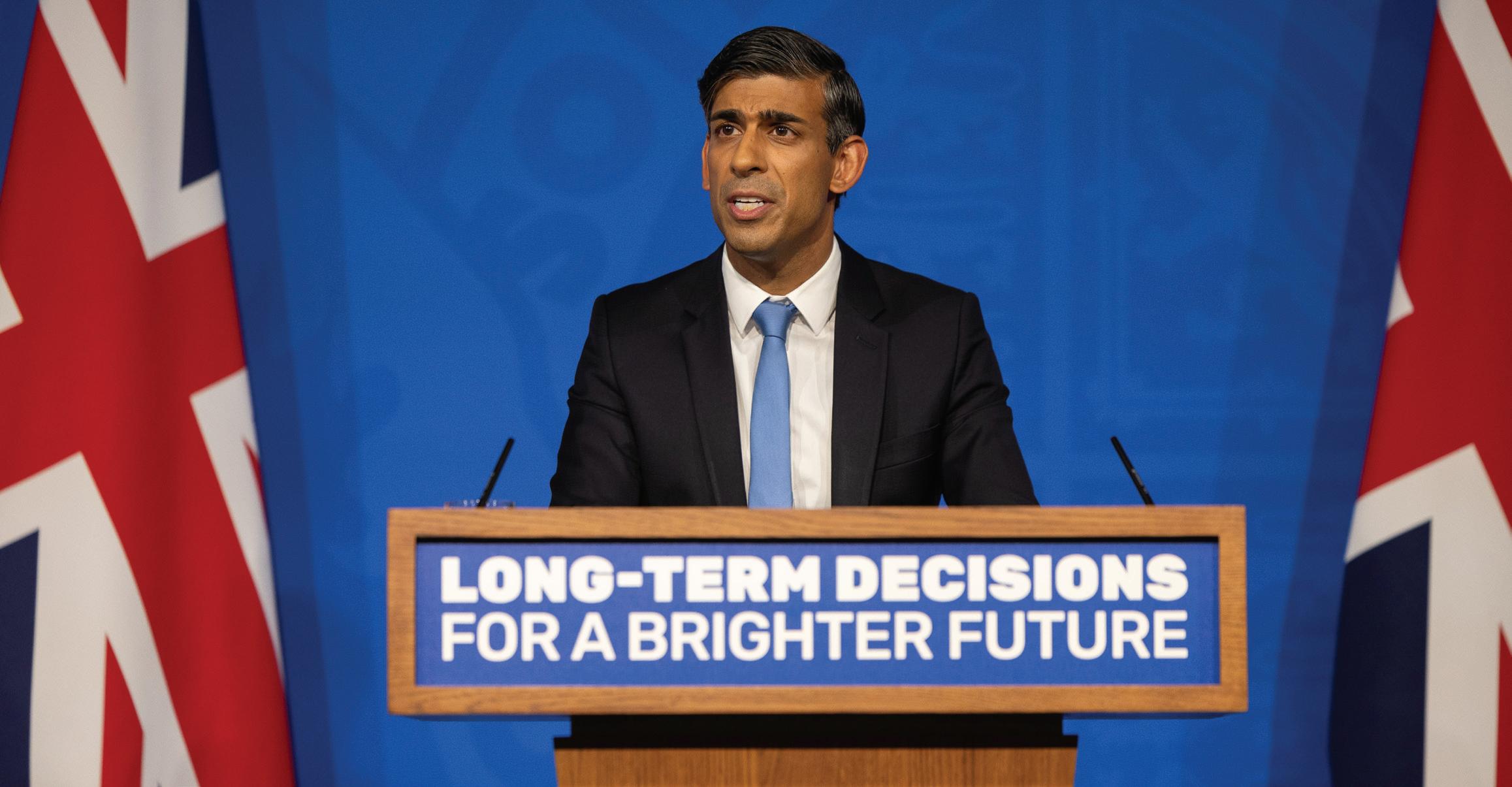
ABOUT THE AUTHOR
“The country that gave the world the railway cannot even build a new line”
Rishi Sunak at his ‘Net Zero’ press conference last month
www.passengertransport.co.uk 6 October 2023 | 17
Norman Baker served as transport minister from May 2010 until October 2013. He was Lib Dem MP for Lewes between 1997 and 2015.
ALEX WARNER

A transport debate with a difference
Last week’s Great Transport Debate in Manchester brought together all modes of transport, and more. But what did we learn?

I’m not going to lie but I make it my place to avoid corporate and social events. I am actually socially awkward and find them a drag. In previous years, if I had to go I’d feign a phone call to dip out halfway through, and when I was in the logistics sector, where some of the events were mind-numbing beyond belief and I knew no one, I’d sit in a toilet cubicle during breaks to avoid making small talk or standing like a loser in the corner on my own. So, you can imagine how I recoiled when CMAC Group asked me to help organise and be the compere at last week’s Great Transport Debate, of which they were the lead sponsor and mastermind. There’s one reason why, though, I soon started looking forward to the event. That’s because the remit from CMAC was that this was to be the opposite of normal events - no self-congratulatory corporate nonsense, dull speakers, but ‘tell it how it is’ charisma, instead. I am going to focus on the vibe in this article because I was so focussed on trying to get my cues right and avoiding booby traps that might cause me to be ‘cancelled’ more times than a TransPennine Express train to Manchester Airport, our host venue, that I confess to not actually remembering much from the debate. This was an extravaganza that had quirks aplenty alongside the customary fads of modern-day events. It took place at the Concorde Hangar parallel to the runway at Manchester Airport and the stage was underneath a Concorde aircraft. There were post-match tours of the aircraft, a gizmo called
‘Slido’ where folk could ask questions in real time for speakers to answer on the spot as well as trendy street food, free bottled beers and champagne for those who promoted the event the most on social media. An incentive wasn’t even needed as we had the Premier League of selfie posers in the crowd in any case, with snaps being taken on arrival and on the ‘party bus’ shuttle back to the airport terminal. The day previously, fellow compere, Neil Micklethwaite took a nice right armed snap for LinkedIn of him all serious professor looking, with a rare appearance of his thick rimmed intellectual glasses on, whilst rehearsing his lines at home. ‘Mickey’ had a fastidious mix of cue cards and a nice notepad with highlighter pen insertions and a fetching
clipboard, far better than my scrunched-up sheets of A4 with a broken staple that I read for the first time in the bath in my one-star hotel on the morning of the event.
Onto the event, and after some ice-breaking frolics, Transport Focus chair Nigel Stevens played a gravitas-exuding blinder, whipping the crowd up into a frenzy with his stern but passionate, posh tone of voice as he made it clear, headmaster-style, that enough was enough, and the current poor customer service is simply not acceptable anymore. Highlighting, in particular, feedback relating to Avanti, among others, no one dared disagree. However, rebel as ever, I mustered up a modicum of bravery to tell this former Royal Airforce big-wig that I couldn’t actually remember the last time I had a bad experience on Avanti. Stevens had set the scene for hard hitting honest debate.
Impressive CAVU Group CEO Martin Evans soon followed, and he talked sense. CAVU’s portfolio includes Manchester Airport, and he concluded that airports needed to become more digitally enabled and this was well received, despite some mutterings from dissidents seated on the tables towards the back; below Concorde’s landing gears, about the inflated prices for beers and burgers inside his terminal. Then Clive Wratten from the Business Travel Association (BTA) took to the stage. He extolled the virtues of working on the move - a great presentation but the ensuing debate focused mainly on rail, and it continually dumbfounds me how little the sector makes use of organisations such as BTA, and also the fact that nothing ever seems to be done to design products and promotions across bus and coach that target those travelling for business. Am I the only one who uses National Express or an inter-urban bus to get to and from meetings and to work en route? Why also doesn’t transport fight back more rigorously and extol the virtues of face-to-face meetings?
The beauty of this event was that it was almost a genuine multi-modal fest. Bus, rail, coach, walking, taxi, aviation - every mode bar e-scooters (next time definitely…). Shame on the transport operators for caring about multimodal ‘when it suits’, in terms of self-awarding rail replacement contracts within their owning groups but not being bothered enough on a dayto-day basis about integration, such that their MDs in the rail division don’t even know the names of their counterparts in bus on the same
18 | 6 October 2023 www.passengertransport.co.uk COMMENT THE GREAT TRANSPORT DEBATE
A quirky venue (underneath a Concorde aircraft) and a quirky host (yours truly)
geographical patch and vice versa - within the same owning group! We were reminded though during the event that taxi doesn’t only exist as a last resort ‘add-on’ to rail or competitor to bus, but it is a key part of the overall solution!
Anyway, we had slight controversy when Claudette Anderson from leading walking app provider Go Jauntly took Peter O’Broin from IATA to task over air travel’s negative impact on the environment. She was on fire and although renowned event organisers BA Events were waving frantically at the back for me to curb the discussion as we were overrunning, I was having so much fun, Claudette just had to continue, though Peter held his own.
I was pleased by the high jinks on Claudette’s panel. On it also was Chiltern’s well-respected Natasha Grice and the most decent and saintly man in the history of UK transport, Martin Dean. I tried to lead Deano into a minefield by encouraging him to berate rival transport owning groups for not following the Go-Ahead model of local markets served by local businesses. He doubles up as CPT top dog, Edinburgh Trams chair and Go Ahead regional bus MD - you don’t get that portfolio without being a diplomatic, intelligent operator and Martin was having none of it, providing a response that was the ultimate in balance.
Alex Hickman, a special advisor to Number 10 during Covid and currently now employed by consultancy Teneo, lifted the lid on the chaos within government, their obsession with managing tomorrow’s headlines and being too heavily influenced by the prime minister’s personality. He spoke of a possible role for transport policy in current government thinking going forward. The audience lapped it up, but I wanted to know whether Alex had attended any of the infamous Downing Street lockdown parties. He said he had not.
Before and after lunch, I enjoyed giving a big shout out to the exhibitors, particularly as they were a right eclectic bunch with such a variety of wares, be it the Transport Benevolent Fund, or the compensation tool Swippr. A word or two for CheckedSafe, a fascinating company I stumbled across nosing around their stand under Concorde’s nose near the free bottles of booze. They have an app that enables bus, coach and van drivers to do their legislative first use vehicle check slickly, generating defect reports so they can be activated pronto by the relevant department. What’s more, they love
my idea of expanding the checks to include customer service issues, such as faulty chargers, broken poster frames and grubby floors!
Rachel Farrington from Visit Britain was particularly interesting, but her presence made me realise that in 30 years I genuinely can’t recall a tourism expert previously presenting at a transport event. How negligent is that from our sector given that we should be utterly fixated with creating reasons to travel, and understanding the purveyors of these, such as leisure attractions and tourism authorities? The canny folk were at the Great Transport Debate, including the top brass at a company called You Smart Thing, animatedly asking questions during the tourism talk. You Smart Thing, we learnt, is a clever management platform for destinations, venue and live events and includes a map-based travel assistant to improve the visitor experience, increasing revenue and guiding customers and hosting organisations on how to reduce the carbon footprint created by travel.
The next smart things to appear on stage were the ‘entrepreneurs panel’, even if it was noticeable how they were all dressed-down dudes, americanos, blue jeans or chinos, and all that. I was gagging for some proper controversy. Surely it could be guaranteed amongst creative thinking, but temperamental entrepreneurs, answerable to no one? The problem was that I laid bare my soul too soon by castigating the way the corporate world turns its nose up at suppliers. This was a panel I was most in awe of, awash with genuine success stories borne of self-starting, risk taking and true entrepreneurialism including Steve Turner, the customer-obsessed creator of CMAC Group and straight talking Scot, John McArthur, the founder of AIM-listed Tracsis who now plies his trade at new disrupter company Lost Group, which he co-founded with yours truly, which aims to be ‘the antithesis of traditional recruitment’. The panel didn’t disagree with my frustrations with the aloofness of some in traditional organisations, but they were more diplomatic and set out the importance of entrepreneurs being embraced rather than treated with suspicion.
Nigel Stevens closed proceedings in the same rousing way that he had started, but super salesman Micklethwaite, who’d had his best performance of the season, couldn’t be denied the last word and rightly so as he professed
that this would be unlike any conference before and that there would be a follow up and we’d solicit volunteers to join an Action Group that might put together a ‘white paper’ and try and arrange a hearing with the transport minister or other pivotal policy-makers.
Despite being a socially awkward recluse, I enjoyed the networking nonsense afterwards, though it may be because the crowd consisted of my mates - there were no scallywags present. People genuinely looked delighted to meet old colleagues and be connected with folk they wouldn’t ordinarily stumble across in their field of work. Folk were milling around long after the cabin doors were finally shut on Concorde and pics were doing the rounds of dancing with drag artists in Canal Street way into the night.
For me, my exit from this fun-packed event was to commit a cardinal crime, that was also a salutary reminder of the ‘needs must’ nature of life. Whilst waiting for the bus back to the Airport to commence my journey home by rail to Surrey, the affable owner of a taxi company at the event, offered me a lift all the way home. We had spent the day talking about how we convince folk to realise the environmental benefits of public transport for long distance travel and shun the car. Cobblers to thatI needed to be home pronto and in the most hassle-free manner too. We had a great journey back - it’s been years since I have been on a motorway for longer than two junctions, and it was a surreal door-to-door experience in wonderful company. Whilst I won’t be trying to pass my driving test at the sixth attempt, I would accept a lift again, given the chance. However, highfalutin and impressive this whopping big debate, no amount of impactful chuntering will solve this kind of scenario and ultimately that’s the Holy Grail challenge that public transport will always have. See you next year, if I’ve not been cancelled!
ABOUT THE AUTHOR
Alex Warner has over 30 years’ experience in the transport sector, having held senior roles on a multi-modal basis across the sector. He is co-founder of recruitment business Lost Group and transport consultancy AJW Experience Group (which includes Great Scenic Journeys). He is also chair of West Midlands Grand Rail Collaboration and chair of Surrey FA.
“The beauty of this event was that it was almost a genuine multi-modal fest”
www.passengertransport.co.uk 6 October 2023 | 19
We need inclusive leadership
October marks Black History Month, an opportunity to build understanding and bridge divides
October marks Black History Month. The theme this year is ‘saluting our sisters’ - recognising the important role Black British women have played in modern Britain through building communities and inspiring change.
Throughout this month, we need to amplify the voices of Black British women in the transport sector, acknowledge their lived experiences and develop the maturity and humility to collectively work together to make things better for everyone. Historically the voices of Black British women have been silenced, papered over, forgotten about.


This year’s Black History Month falls on the 75th anniversary of the arrival of the passengers
of the Empire Windrush in the UK. The treatment of the Windrush generation is and will remain a shameful stain in British history. Windrush was a direct result of a body of legislation designed to create a Britain hostile to migrants by denying them access to public services by a political establishment which pandered to anti-immigrant sentiment legislating against ethnic minorities by asking them to prove their ‘Britishness.’
Brit-ish
This need to prove your British-ness is still felt in modern Britain today. I grew up under the New Labour government. A time when I felt that being British was an inclusive identity - very much defined by our shared values, tolerance, common bonds and mutual respect. This doesn’t however mean that I haven’t had my Britishness questioned. Norman Tebbitt’s ‘cricket test’ was my generation’s Enoch Powell’s River of blood speech. The sinister insinuation that minorities would never truly be loyal to this country led many to feel like they were never or could never be British. It made many minorities feel unwelcome.
Then Covid laid bare these feelings. The lack of attention and institutional protection for Sabina Nessa and transport worker, Belly
This year’s Black History Month falls on the 75th anniversary of the arrival of the passengers of the Empire Windrush in the UK
“Have a look around our stations, we feature some of our amazing Black female station colleagues”
20 | 6 October 2023 www.passengertransport.co.uk COMMENT BLACK HISTORY MONTH
Nafisa Nathani
Mujinga, who were both murdered during the height of Covid provided proof of this. Minority women who are British - but not claimed as such. This is why the theme this year of celebrating Black British women is so important. Throughout October have a look around our stations in the Southern region, we feature some of our amazing Black female station colleagues, each explaining why Black History Month is important to them.
Black history is British history
Let’s not get confused. Black History is British History. The British empire’s reach was far and vast. This acknowledgment is important. I want my nephews and nieces to grow up in a world in which they are proud of their rich culture and heritage. Where they feel a sense of belonging. Their DNA is very much a reflection of how far the tentacles of the British empire extended. I want them to live in a world where they feel like they belong. I do not want their ‘Britishness’ or loyalty constantly questioned. I don’t want them to ever live in fear that their British citizenship could easily be taken away at any time, with any slight misstep. To get to this place, we need to be honest about our national history, what it truly means to be British, acknowledge each other’s experiences and have an honest conversation about immigrants and the role they play in modern Britain today.
We are social beings, and we need to interact with each other to build mutual respect and understanding. Studies have proven how positive encounters between people of different groups lead to reduced conflict in society. This is one of the reasons why our workplaces need to be representative of the communities we serve. Not only does integration foster creativity, ingenuity and make financial sense, we have a moral imperative to do so to foster social cohesion. I do accept the progress we have made. The Britain I grew up in was very different to that in which my parents did in the 1970s. My parents grew up in a time when racism was vicious and visceral and woven into the fabric of society in a way that is very difficult to imagine now. Now, you can’t turn a street corner without seeing diversity and smelling the aroma of different spices and cuisines.
On the surface today, it may feel like as a society, we have embraced diversity. However
there has been a rise in inflammatory language, anti-migrant rhetoric and fear mongering among our political establishment, inciting division, and discord on the ground. I have friends who despite being born in this country still refer to themselves as ‘second generation immigrants’, leaving me wondering when a community ever stops becoming immigrants and can be just British? This failure by some groups to acknowledge themselves as British, is a direct result of a hostile environment that has created an ‘othered’ group so separate and removed from its host that hostility, rather than hospitality has become the default response. We need to acknowledge and understand how and why this is happening through conversation, respect and compassion. With trust in leaders eroding and demographic change inevitable, it is no surprise that some groups have become more insular, in a bid to survive.
If our workplaces do not give us all an opportunity to have diverse, constructive and positive places, to have meaningful encounters with each other, break down stereotypes, create opportunities to progress and collectively work together towards a common goal, I fear we will forever remain divided as a society. There is inherent joy and happiness to be found in working together, building consensus and driving change. If this doesn’t happen, people will then look elsewhere to satisfy their need to belong, and this can be dangerous.
Everyday realities
Feeling safe and secure is fundamental to integration. It is difficult to feel connected to those around you if you are constantly looking over your shoulder, feel othered and are systematically discriminated against.
In an RMT survey of more than 1,000 members who work on either the London Underground, Overground or Transport for London (TfL) rail services, 76% of publicfacing staff including station staff, drivers and cleaners, reported they had been subjected to workplace violence from passengers. 28% of front-line staff reported being racially harassed and 7% had been sexually assaulted. This is why in the Southern region, we have created a staff abuse campaign to tackle this threat and make people think twice and treat out staff with the respect they deserve. Transport workers are heroes. We helped move goods
and key workers throughout the pandemic and without them, Britain would have ground to a halt. No-one deserves to be spat on or treated with disrespect for doing their job.
Let’s come together
This Black History Month let’s come together. We may experience the world in different ways, but we need to listen to each other, understand each other’s realities and perspectives and work collectively to make things better. Covid played a crucial role in bringing to the forefront not only how inequitable modern Britain is but how sinister these inequalities can become when compounded.
We live in an age in which in most societies there is an abhorrence to racism, but bigotry and discrimination still disfigure the day-to-day lives of many. We also live in an age in which our thinking is saturated in celebrating and embracing our differences rather than the common identities we share as human beings. Without effective inclusive leadership, tribalism, extremism and polarisation can and will happen. We so desperately need to get back to a place of social cohesion and mutual understanding, where being British is seen as an inclusive identity. Where it does not matter about the colour of your skin or what cricket team you support. Where there is no ‘test’ to your loyalty.
Let us not shy away from having these conversations and what it means to be British. It is only by talking about our experiences and our realities that we can bridge the gap and help everyone understand what we need to change and why.
ABOUT THE AUTHOR
Nafisa Nathani is Southern Region Lead for Cultural Fusion, Network Rail’s race equality network. Cultural Fusion is open to all those who work in the rail sector. To join, email culturalfusion@networkrail.co.uk
www.passengertransport.co.uk 6 October 2023 | 21
“We may experience the world in different ways, but we need to listen to each other”
COMMENT NICK RICHARDSON

Rural communities need their railways

Rural
Unremunerative train services have always been a problem. They cost a great deal of money to operate with limited prospects of permanent revenue streams and hence are never likely to generate anything approaching a profitable scenario. However, their value lies in their function, not the balance sheet. The communities they serve are to some extent dependent on their services even if they are infrequent, ensuring that rural areas do not become the sole preserve of car users. Many visitors to rural areas have a rail option available, a useful contribution to keeping those places intact by limiting the pressures of invasive volumes of cars.
Subsidy is essential
Britain, as the pioneer of railways, had hundreds of lines promoted for which the legacy of many ranges from nothing on the ground through bankruptcy to isolated buildings. Although many were wiped out in the Beeching era, some never survived even that long. The result of a piecemeal approach was that the network achieved was far from optimal and was shaped heavily by the roles of landowners and investors. Aspirations for routes with glancing references to longer term needs substituted for a business case.
Inevitably many lines that did materialize faced years of underuse and as large operators swallowed up many smaller lines, the financial burden persisted. Those lines that remain today are a testament to the persistence and
ideals of those that created them, maintaining a vital role through the services they provide. However, they continue to require subsidy, an inconvenient truth that has been treated unhelpfully for decades.
When the four main railway companies came into being in January 1924, the hope was for standardization, cost savings and integration. They achieved this to a large extent, but continued to face the dilemma of rural services that cost far more to operate than they ever hoped to generate. After WW2 which took a huge toll on the railways, the 1948 nationalization took on a situation in which three of the four component businesses lost money. The railway has always needed subsidy and through the British Rail years, the
Regional Railways sector was supported by the Public Services Obligation, a government designated fund that was somewhat reluctantly directed to maintaining services where they would otherwise be withdrawn. Cost savings were needed and delivered and today’s services have simpler infrastructure and fewer staff.
Into deepest Wales
Relating this demonstrates how the rural railway continues to evolve and provides a lifeline to many otherwise isolated communities; the Heart of Wales Line provides an extreme example. Previously known as the Central Wales Line or the Craven Arms Branch, it survives as a link between numerous places, some 28 stations between Craven Arms and Llanelli. 12 of which begin “Ll”. Between Shrewsbury and Llanelli, the 110-mile journey takes almost four hours. Many of the stations are request stops that require users to tell the conductor if they want to leave the train or to wait on the platform then signal to the driver; in practice, most trains stop at only a few of these. Some of the request stops have houses in the former station buildings so the inhabitants do not have to go far to find a train. There are no junctions along the route (the few that existed are long gone) so journey options by train are limited and the trains themselves are often a single carriage. Infrastructure changes on the largely single line route have seen signalling simplified, eliminating huge costs. Off-peak fares are good value and should appeal to visitors as well as locals. Inevitably though, even if all the trains were full, revenue still pales into insignificance against operating costs.
As an extreme example of a rural route, the Heart of Wales Line is promoted actively, building on its remoteness for those visiting the area and wishing to venture further on foot. There is a Heart of Wales Line Trail long distance walk which connects with some of the stations and other long distance paths. With connections at Shrewsbury to the north and Llanelli and Swansea to the south, the line is suited to days out provided that users make plans to fit in with the line’s five daily trains each way. Its community rail partnership, The Heart of Wales Line Development Company, is a not for profit means of promoting the line and is supported by train operators and
rail services have long been a challenge, but their vital role connecting remote communities transcends the balance sheet
22 | 6 October 2023 www.passengertransport.co.uk
The 110 mile journey along the Heart of Wales line takes almost four hours
@ciltuk
community organisations.
The efforts to promote the line are to be applauded but we know that the operator, Transport for Wales, has limited funding and as some commentators have pointed out, weighs heavily in favour of rail rather than bus. The Heart of Wales line swallows up funding in maintenance and subsidy simply because it is valued but indivisible. There are signs that vegetation management is a losing battle and although some sections have encroaching vegetation cut back, much of the route does not, to the point where the bushes brush along the side of the trains. Allocating sufficient resource to deal with miles of growth is a decision with a high cost but illustrates how basic tasks on a long rural route become big problems. Substituting buses when line maintenance is needed or when trains are otherwise unavailable is not straightforward and reinforces the view that the railway is relatively direct even if it isn’t particularly rapid. It seems unlikely that more cost savings could be achieved so the situation in which considerable subsidy is needed is a permanent one.

The only other north to south route in Wales is the Newport to Shrewsbury line with TfW trains continuing to the North Wales Main Line. This has forays across the border into England and retains some semaphore signalling, for now at least. Several daily trains are formed with a Class 67 locomotive far from being stretched to its full abilities, with driving trailers and a few coaches. This route appears to be well used even if many of its users are making relatively short journeys rather than the full north-south option.
Subsidy or investment?
The scorn applied to such passenger transport services arises from their grubby need for subsidy. Rural trains have always attracted criticism because they have never been and are unlikely to ever be remunerative. We all know that costs increase over time and hence the subsidy needs to increase accordingly. This should not be a problem if cross-subsidy is available with gains from other routes being used to support losses elsewhere; this has been common practice for decades. Our continental colleagues have no problem with subsidy because they recognise the value of their public services; this enlightened
approach should apply here with appropriate controls in place to make sure that subsidy doesn’t become a gravy train. As is so often the case, funding availability becomes the main consideration in decision-making, over-riding consideration of social benefits. This is deeply regrettable, especially as we now have the prime minister labelling himself as a friend of the motorist. Funding is finite as we all know but decisions about spending have to be made in the context of prevailing policy. If that policy is contradictory as it has been for transport for years, then we should expect resistance to maintaining and improving public passenger services.
Transport overall has a healthy budget but much of it is directed towards activities that are the opposite of progressive policy, notably
road construction and subsidies for road users. Shifting some of this would be detrimental to relatively few people and highly beneficial to wider society – we should be welcoming rural rail services and supporting them accordingly. Any aspiration to make the railway network as a whole pay its way is missing the point and shows a lack of understanding of what is important and what the priorities should be. The latest skirmishes about climate change, reducing carbon and so on serve to show how there isn’t a genuine commitment to anything that involves substantive change on the part of government, a truly shocking admission.
ABOUT THE AUTHOR

Nick Richardson is technical director at transport consultancy WSP and chair of CILT’s Bus and Coach Policy Group and is a former chair of the Transport Planning Society. In addition, he has held a PCV licence for over 36 years.
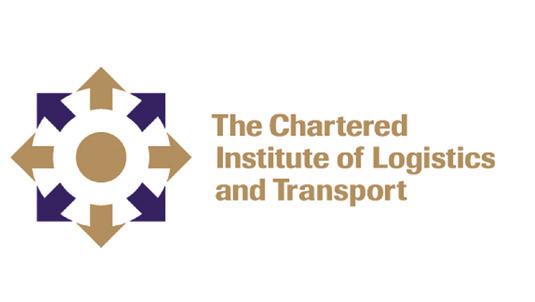
IN ASSOCIATION WITH: www.ciltuk.org.uk
01536 740100
Tel:
“We should be welcoming rural rail services and supporting them”
www.passengertransport.co.uk 6 October 2023 | 23
The debate over rural rail services should not revolve solely around profitability
ENERGY MARKET REPORT
Why France’s energy sector leads the pack

The Rugby World Cup is now well under way and in a “tradition” that goes back to the 2012 London Olympics, we will link this month’s report to a major global sporting event. As hosts and joint favourites to win the tournament, the French rugby team combines power, technical prowess and an uncharacteristic dose of on-field discipline. Does France’s energy sector have the same traits and have two more unrelated subjects ever been so clumsily linked?!
As one would expect for the world’s seventh largest economy (GDP), France has a mature and competitive petroleum retail sector. As you’d also expect from a developed western economy, petroleum products in France are heavily taxed! At 69 euro cents per litre (circa 59 pence per litre = 59ppl), French duty on petrol is notably higher than in the UK (53ppl) and this results in a price for petrol (167ppl) that is around 15% greater than in Britain. When it comes to diesel, France is in line with almost every other country in Europe, whereby excise duty is applied at a lower rate to petrol. Therefore, French diesel buyers pay 61 cents per litre tax, which is in fact about the same as the UK’s 53ppl (petrol and diesel are taxed at identical levels in the UK), contributing to an overall diesel price of around 160ppl per litre in both countries.
Unlike their North Sea neighbours, France has no indigenous oil production. Therefore the
country is one of the largest importers of crude oil in the world, bringing in over 665,000 barrels (105 million litres) per day, predominantly from Norway, USA and the Middle East (obviously Russia prior to 2022). Processing all of this is the French refining industry, which has been downsizing. In 2012 there were 12 French refineries, but now that number sits at only six and of those, all but two refineries are owned by France’s energy giant TotalEnergies.
As a company, Total enjoys almost monopolistic power in France’s fuel sector and is run by the no-nonsense engineer, Patrick Pouyanné. The son of a customs officer, born in Rouen but raised in France’s deep SouthWest (and by the looks of him, a decent prop forward!), Pouyanné became CEO in 2014. Since then, he has successfully transformed the company from a one-trick exploration pony (which many saw as little more than a supplementary arm of the French foreign office), to a truly global energy colossus. It is the third largest ‘Big Oil’ company on the planet (after Exxon and Shell), with revenues over $185bn and annual profits of around $16bn (twice that of BP). Since 2014 it has provided the highest level of shareholder returns in the ‘oil major’ community, with a whopping 75%
return since 2014 (by comparison, Shell sits at 50% and BP a lowly 30%). Such success has placed Pouyanné under considerable public scrutiny in his home country, but there are few signs that “Le Boss” craves either affection or praise. In 2022, he publicly bemoaned the fact that “all politicians seem to have only just discovered that the price of electricity is linked to the price of gas”. Moreover, he has been unapologetic in his views around continued oil and gas exploration, which go alongside low carbon investments to the tune of around $35bn (twice that of the industry average). Pouyanné is insistent that only continued oil and gas exploration can generate the necessary returns to pay for these renewable energy projects. The other energy company in France that comes close to monopolistic status is Électricité de France (EDF). Generating over 80% of the country’s electricity, EDF runs all of France’s 56 nuclear reactors, which account for over 70% of France’s electricity. Developed in the 1950s, but rapidly expanded by the French Government after the 1974 oil shock, France’s nuclear power sector is the most developed in the world and they have plans to build up to 14 new nuclear generators by 2050. Whether nuclear is a truly green industry is a debate for another day, but if you lump nuclear generation in with energy from hydro power (11%), wind (7%), solar (3%) and bio/waste (2%), you end up with an incredible 93% of French electricity being generated by “emissionless” sources - an unprecedented state of affairs anywhere in the world. It also results in France having one of the lowest carbon footprints in Europe. Only six tonnes of CO2 are emitted per person per annum, compared to coal-hungry Germany (nine tonnes) and Britain at around 7.5 tonnes.
To this observer, France’s energy policy (along with their 2023 Rugby World Cup squad) looks pretty strong. The country’s flagship oil and gas company make billions in profits and is run by a grounded technocrat who neither shirks from the realities of energy complexity, nor engages in the tedious world of greenwashing. At the same time, the country’s nuclear industry delivers a level of low carbon energy independence that most developed nations would die for. We Brits may be loath to admit it, but not only does France’s Rugby team look very possible winners of this year’s tournament, successive French governments have also done pretty well in the Energy World Cup!
A highly-profitable flagship oil and gas company and low carbon energy independence that most developed nations would die for
James Spencer Portland
“Only six tonnes of CO2 are emitted per person per annum [in France]”
COMMENT WANT TO KNOW MORE? Visit Portland’s fuel forum page: portland-analytics.co.uk/fuel-forum 24 | 6 October 2023 www.passengertransport.co.uk
PORTLAND FUEL ANALYTICS - OCTOBER 2023
GREAT MINSTER GRUMBLES

Don’t just trim HS2 - scrap Phase 1 too
the £36bn saved will start to make a difference to voters around the country before the next general election. One change that will certainly make an impact is the extension of England’s £2 bus fare cap until December 2024, instead of rising to £2.50 as planned.
But I wonder whether the prime minister could have gone further. Having a ‘high speed’ railway that only gets you from London to Birmingham sounds a bit daft, does it not? That’s why I think we should also stop building Phase 1 too. There’s no point to Phase 1 if Phase 2 is scrapped. I’m sure there are plenty of people out there who can think of alternative uses for those parts of the project already built.
Our
Whitehall insider imagines what’s going on inside the minds of the mandarins at Great Minster House, home of the DfT
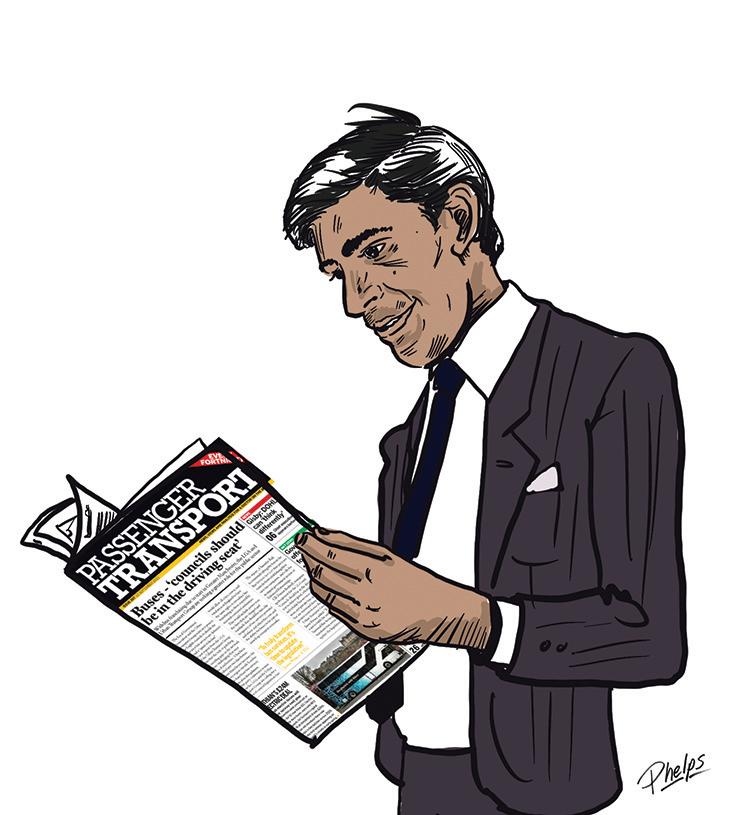
Just in case you hadn’t noticed, HS2 has been in the news rather a lot this past couple of weeks, ever since an eagle-eyed journalist noticed that the future of the westerly leg from Birmingham to Manchester was an agenda item for a meeting between the chancellor and the prime minister as Jeremy Hunt walked up Downing Street with the agenda papers he was carrying in full sight of the waiting journalists. When will ministers learn to put their meeting papers in an envelope or briefcase?
The news that the westerly leg of HS2 was likely to be scrapped resulted in the inevitable uproar from various elected mayors, including the Conservative’s own mayor for the West Midlands, Andy Street, any number of businesses, construction companies and the like. The supporters of the project even managed to roll out Lord Heseltine, for goodness’ sake, who claimed that scrapping the project would amount to an abandonment of the levelling up agenda. Does anybody actually still listen to Lord Heseltine these days?
Do these evangelists of HS2 have no regard for the monstrous ballooning costs of the project or the fact that its business case simply does not exist? Do they think the project should go ahead under any circumstance, regardless of these issues? That, surely, is the height of irresponsibility. They talk as if HS2 is the only rail project in town, as if the entire levelling up agenda was based on HS2. Both points are demonstrably untrue. And just think of the amount of rail investment or funding of
bus services - or both - that could be provided for a fraction of the cost of HS2.
The wait was finally ended when the prime minister addressed the Conservative Party conference in Manchester this week. The westerly leg is scrapped, and “every single penny” is to be invested in a plethora of bus, rail and road schemes in all parts of the country. The prime minister will be hoping that some of
Despite the scale of the reaction the prime minister and chancellor stuck to their guns. I’m glad they did. In his recent Net Zero speech the prime minister said that the government would “change the way our politics works”, that the government is going to make “different decisions” and that it “won’t take the easy way out”. He asked if government “can be brave in the decisions it takes, even if there is a political cost” and if the government “can be honest when the facts change, even if it’s awkward”? And he has.
I think it’s fair to say that these new decision-making criteria - if I can describe them as such - apply to the decision the prime minister has to take on HS2. The facts on HS2 have changed. Yes, it is a politically awkward decision. So I say to our PM - although I have a hunch he probably doesn’t read Passenger Transport magazine (apologies to the editor!) - if you start to buckle under the pressure being applied, just re-read your Net Zero speech, look yourself in the mirror and ask yourself if you meant what you said.
Because if you did, then you must surely scrap this monster of a project - all of it. There are siren voices who accuse you of treating the north with disdain, who will scream and shout about the UK’s failure to invest and all the rest. You can hear it all now. But there will be plenty of people who will entirely agree with the decision, even if they remain silent. HS2 has already blighted many people’s lives and they will doubtless feel pretty sore that they’ve had to put up with so much misery for no purpose.
It’s the right decision, and it’s one that needed to be taken soon.
COMMENT
www.passengertransport.co.uk 6 October 2023 | 25
“Do these evangelists of HS2 have no regard for the monstrous ballooning costs of the project?”
New CEO for Stagecoach
Group announces the appointment of former Yell chief executive Claire Miles to top job
Stagecoach has announced the appointment of Claire Miles as its new chief executive officer.
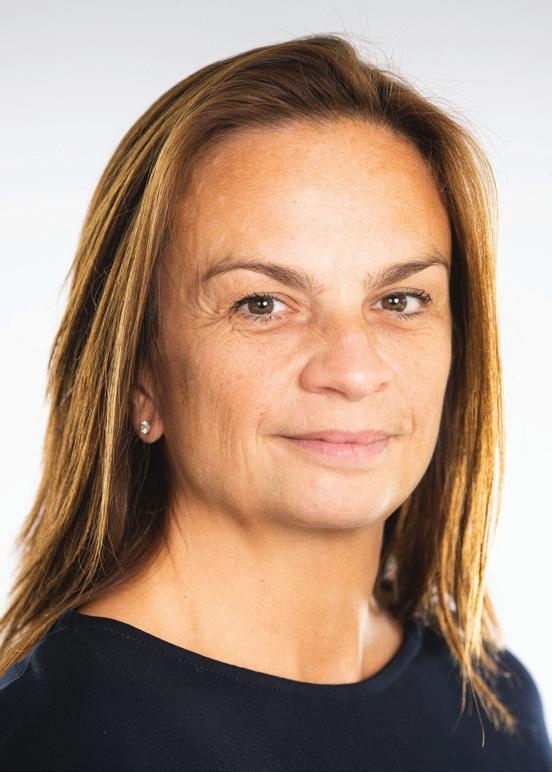

Miles succeeds Martin Griffiths, who retired as chief executive in January. She joins the Perth-based group after a period as interim chief executive at Fintech start-up MAC II Ltd but was previously chief exective of Yell between October 2019 and December 2022.
Miles began her career in the insurance industry as a data scientist, before spending a few years in data and insight consultancy at both CACI and Dunnhumby, supporting their financial services customers.
She then led and developed credit card businesses for HSBC, GE Money, and Santander before joining the energy industry at Centrica. At Centrica, Miles led several different business units and operating divisions over a period of nine years which included being managing director of British Gas Energy
APPOINTMENTS
GO-AHEAD GROUP
Go-Ahead has announced that Go-Ahead Singapore managing director Andy Thompson is to return to the UK in a new role with the group.
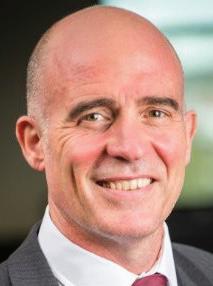
Efficiency, HomeCare, Centrica UK Customer Operations and culminating as managing director of Hive. She also holds non-executive positions on the boards of Biffa and Capita Plc. In addition to her company roles, Miles is a visiting professor at Aston University.
“I am delighted to welcome Claire as our new chief executive officer after a thorough recruitment process,” said Ray O’Toole, Stagecoach’s executive chairman. “She brings with her a wealth of experience and commercial acumen that will enable us to exploit the exciting prospects for growth that we see for the future.
“Claire will have a detailed induction into our operations across the length and breadth of Great Britain, allowing her to be fully immersed into the sector and to get to know our business. During this induction phase I will continue to work in my capacity as executive chairman before reverting back to my role as nonexecutive chair of Stagecoach.”
Miles said she was grateful for the opportunity to get to know the business at the start of her appointment. “I believe the investment in a comprehensive induction and handover will set me up for success as I take up the reins of the business,” she said.
Go-Ahead said the new role for Thompson (pictured) follows a period of prolonged success for the group’s Singapore operation. The company runs 440 buses on 31 routes on the island with a commuter satisfaction score of over 90%. Go-Ahead’s contract to operate buses was extended by the Land Transport Authority last year, and runs until 2026.
He will be succeded in Singapore by Go-Ahead Singapore engineering director Leonard Lee
BRIGHTON & HOVE
Go-Ahead has announced the appointment of Gordon Frost as operations director at Brighton & Hove and Metrobus.
Frost (pictured) will join the business in December and his appointment follows the move of incumbent Alex Chutter to sister company Oxford Bus Company.
Frost joined the industry in 1988 as a graduate trainee and since then has held a number of roles, both operational and commercial spanning a career of 33 years. He joins from Stagecoach South where he held the position of operations director and then latterly interim managing director.
STAGECOACH
Stagecoach has announced a management reshuffle at its bus operations in the north west of England as it prepares to take on two Bee Network bus franchise contracts. It sees Stagecoach Manchester managing director Lee Wasnidge taking up the new role of managing directorfranchising mobilisation.
Wasnidge (pictured) will lead the mobilisation team for Stagecoach’s successful capture of the two large franchises in the second tranche of Bee Network bus franchising contracts which go live in March next year.
Meanwhile, Rob Jones moves from managing director of Stagecoach Cumbria and North Lancashire to become managing director of Stagecoach’s existing deregulated bus business in the south of Manchester.
Succeeding Jones at the Carlisle-based operation is Tom Waterhouse, Stagecoach Cumbria and North Lancashire’s operations director. A former Stagecoach graduate trainee, he takes on the role of interim managing director.
NORTHERN
RAIL
Train operator Northern has announced the appointment of Jayne Breen as head of property.
Claire Miles
“I look forward to working with Ray and the rest of the leadership team as we continue to build a highly successful, customercentred business.”
“Gordon brings a wealth of industry experience in delivering outstanding bus services for passengers,” said Brighton & Hove and Metrobus managing director Ed Wills. “I would like to congratulate Gordon on his appointment.”

Breen (pictured) joins from Carlisle Support Services but is a familiar face as she was previously Northern’s head of engineering services. Prior to that she was also the train presentation delivery manager for their services in the north west, managing the train cleaning operations.

CAREERS 26 | 6 October 2023 www.passengertransport.co.uk
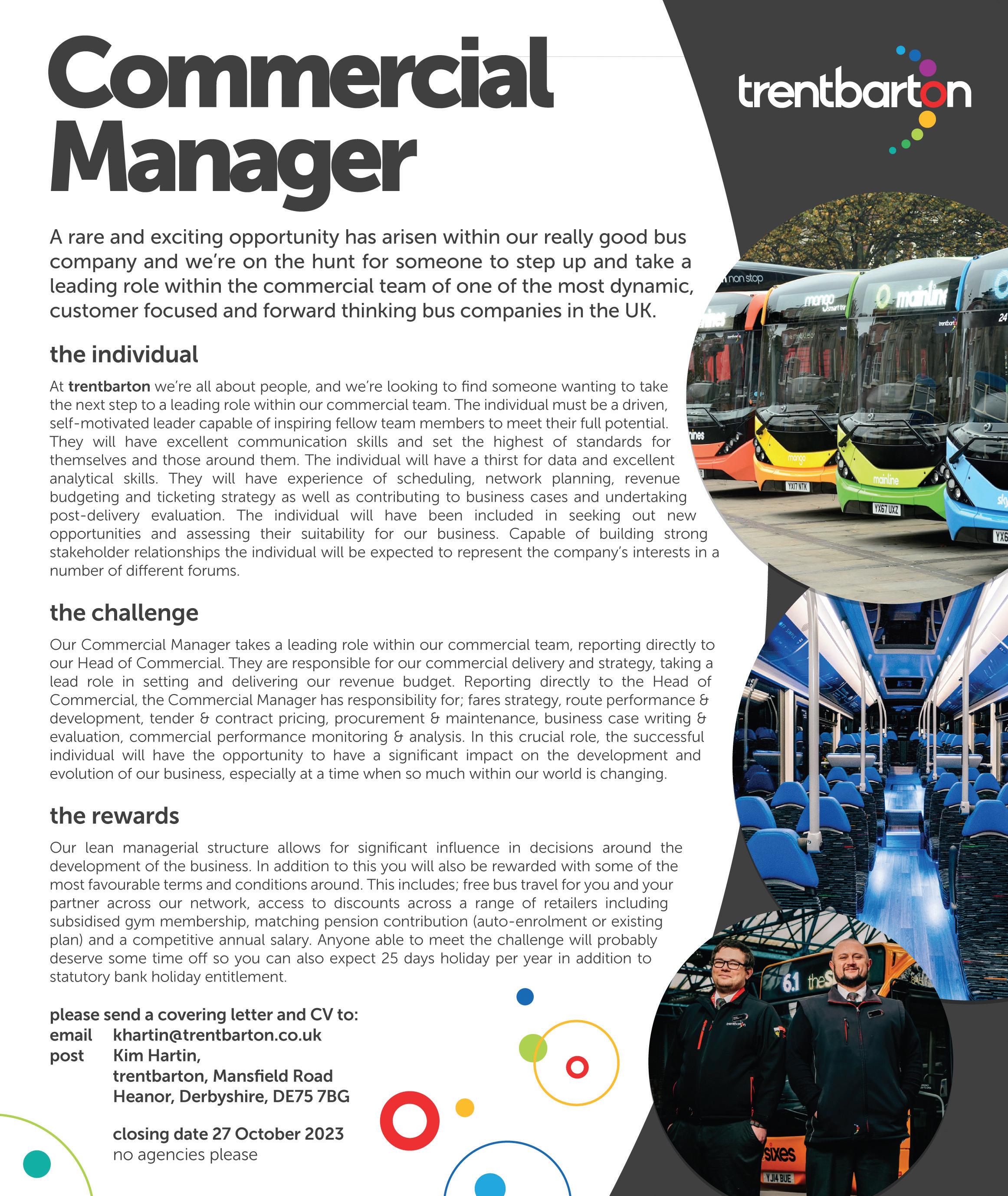
CALL NOW TO ADVERTISE 020 3950 8000 or email sales@passengertransport.co.uk www.passengertransport.co.uk 6 October 2023 | 27
DIVERSIONS
From ‘Ptegasaurus’ to ‘Brian the dinosaur’
Jonathan Bray can’t resist a dig at his old adversary
Revenge, they say, is a dish best served cold - and former Urban Transport Group director Jonathan Bray recently enjoyed a pint of it alongside a small dinosaur.

As a campaigner and then as director of PTEG (which later became the Urban Transport Group), Bray worked tirelessly to bring buses back under public control - even through times when the idea seemed a distant prospect.
In October 2006, Stagecoach
founder Brian Souter spoke at a conference in Leeds to mark 20 years of bus deregulation. He was accompanied by a very large plastic dinosaur named ‘Ptegasaurus’ -
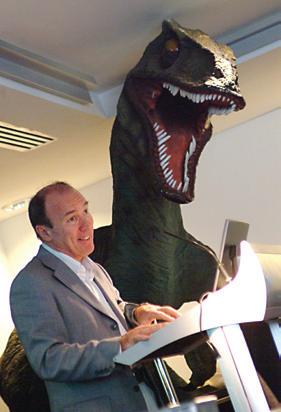
A TRAM SYSTEM FIT FOR A KING
King Charles and Queen
Camilla embarked on a regal escapade to Bordeaux during their recent state visit to France. Amidst their demanding duties,

such as indulging in local cheese and sipping on a glass or two of Bordeaux’s finest red wine, they stumbled upon a peculiar mode of transport to tour the city - the local tram network!
Equipped with tram tickets fit for royalty, the couple climbed aboard, King Charles posing the pivotal question, “Which way are we going?” After a few moments of mild confusion, they gracefully settled into their seats, waving regally at the passing crowds as they glided serenely by.
The Bordeaux tram system
which he said symbolised the ‘prehistoric agenda’ of PTEG. Souter vigorously opposed any efforts to reverse bus deregulation, even stating that he would sooner “drink poison” than support it.
PassengerTransport received an email from Jonathan Bray last week from Greater Manchester, where deregulation has now been reversed with the first phase of bus franchising now in operation. The next phase will largely be operated by er.. Stagecoach.
“Millions of lost passengers later I thought I would return the favour by bringing ‘Brian the dinosaur’ along to the launch of the Bee Network,” Bray gleefully revealed.
opened in 2003, just three years after it was recognised by the French Government as as a Public Interest Project and gave approval for construction to commence.
And as fate would have it, Bordeaux, with its sleek tram system, gave the royal couple a taste of what efficient urban public transport looks like - a sight that surely had Bristol, Bordeaux’s twinned British city since 1947, green with envy, considering it’s been pining for a similar mass transit system for many, many years!
STAGECOACH EAST HAS A SWEET SPOT
Stagecoach East staff recently embarked on a ‘Bake-Off’ competition, whipping up sugary creations to raise plenty of dough for Roald Dahl’s Marvellous Children’s Charity.
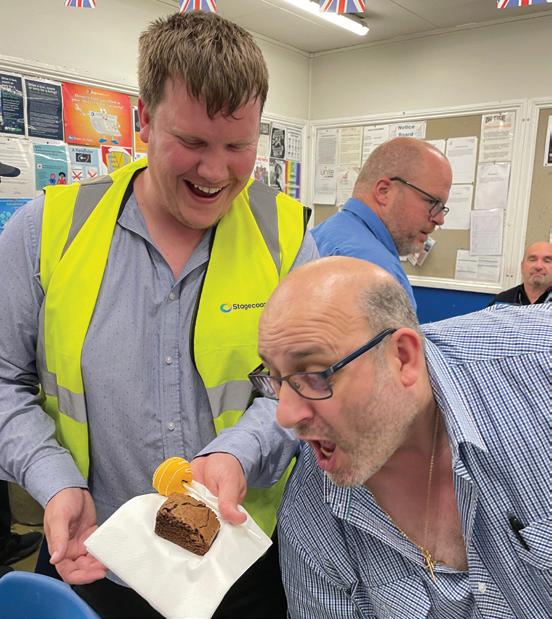
Entries included whimsical treats like James and the Giant Peach cake and ‘bus-coff’ cakes. And then, of course, there were the Everlasting Gobstoppers. You might think they’d be indestructible, but these were gone in a flash! Baked by Peterborough operations manager, Hayden Mustafa, these treats were declared the winners, proving that he really did have a recipe for happiness!
SEEN SOMETHING QUIRKY?
Why not drop us a line at editorial@passengertransport.co.uk
SUBSCRIPTION
All annual subscription rates include delivery by secondclass post, or airmail for overseas. ANNUA L SUBSCRIPTION R ATES 1 year UK: £140 EU & Rest of World: £280 2 year UK: £250 3 year UK: £375 WWW.PASSENGERTRANSPORT.CO.UK N A M E JOB TITLE CO M PANY ADDRESS POSTCODE TEL E M AIL DATE PLEASE START MY SUBSCRIPTION TO PASSENGER TRANSPORT CARD NU M BER SECURITY CODE EXPIRY DATE SIGNATURE I enclose a cheque for £ made payable to Passenger Transport Publishing Limited Please invoice my company (official order enclosed) I authorise you to debit my M astercard/VISA/ M aestro/VISA Electron card. Amount £ PT298 Email: subs@passengertransport.co.uk Return to: Subscriptions, Passenger Transport Publishing Ltd, PO Box 5496, Westbury BA13 9BX
ORDER FORM
Bake-Off bus-ts the norm!
‘Driver, next stop please!’
Brian Souter, Ptegasaurus and ‘Brian’
28 | 6 October 2023 www.passengertransport.co.uk








































